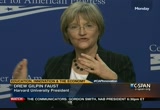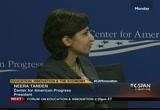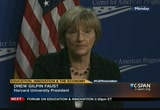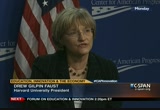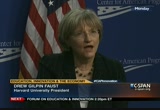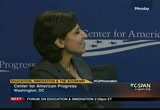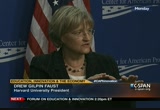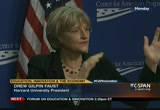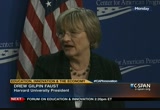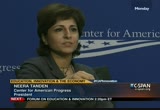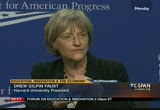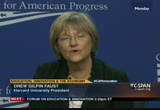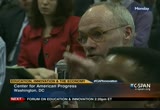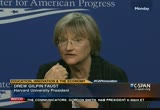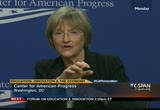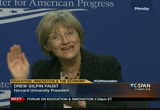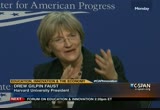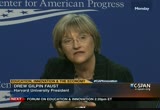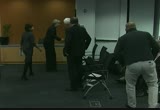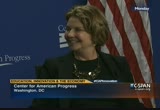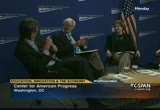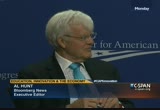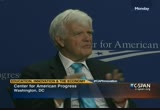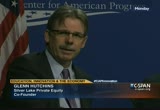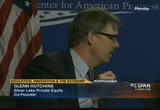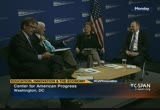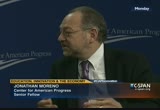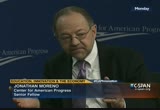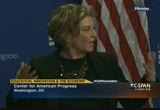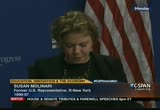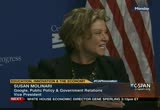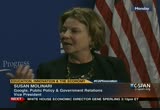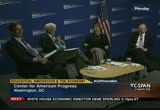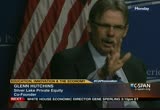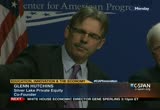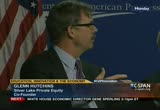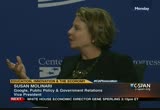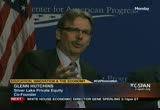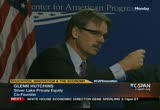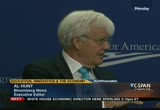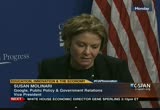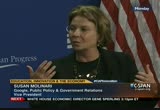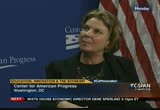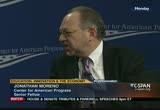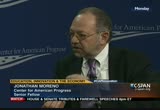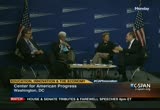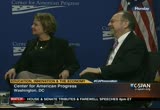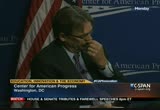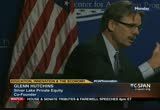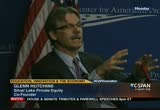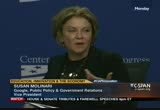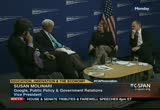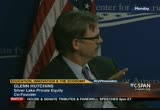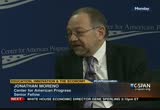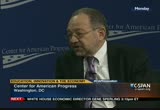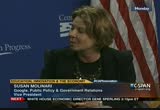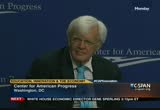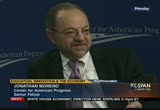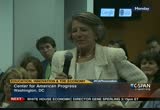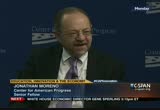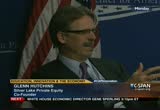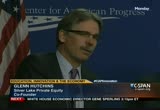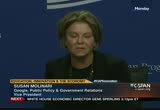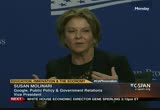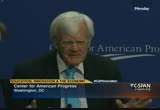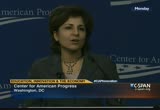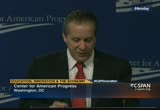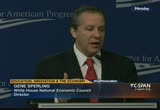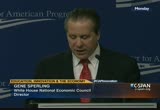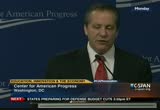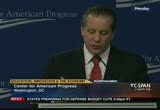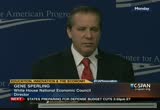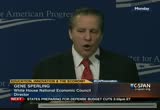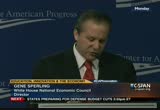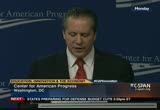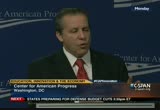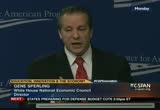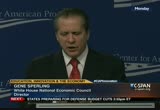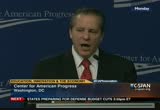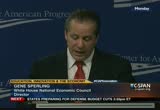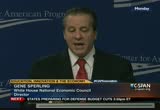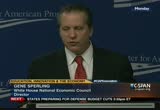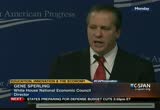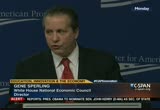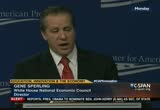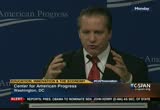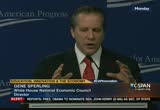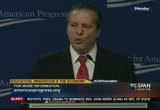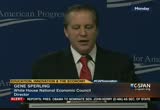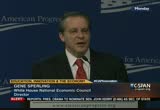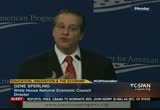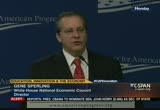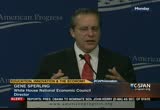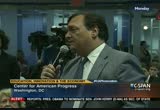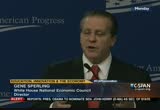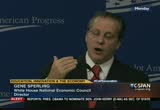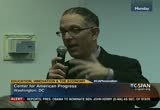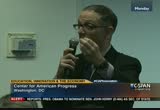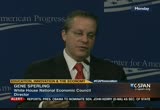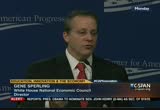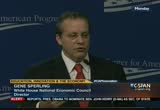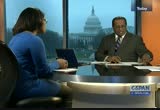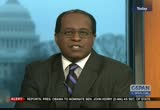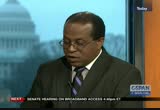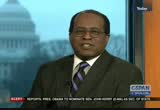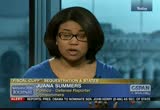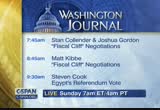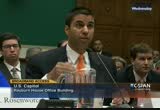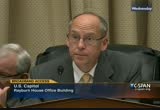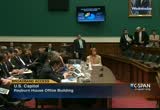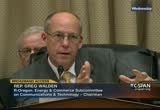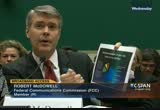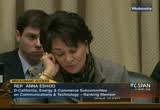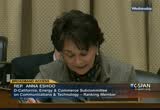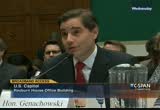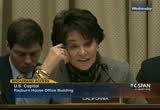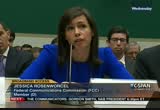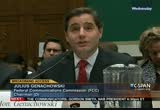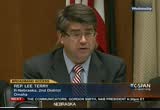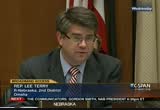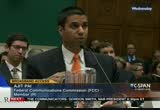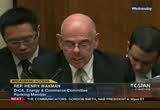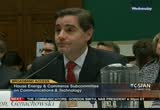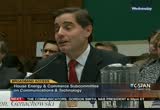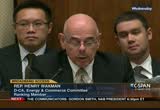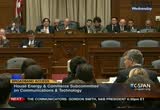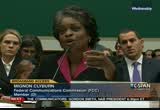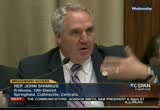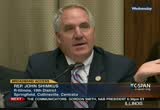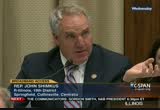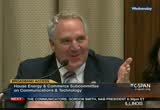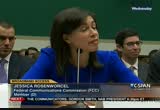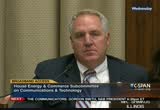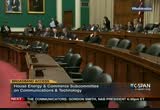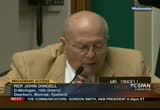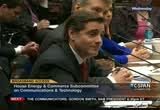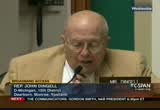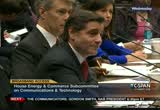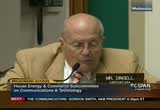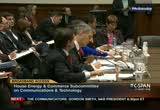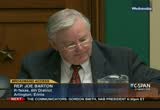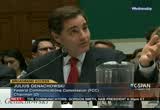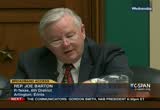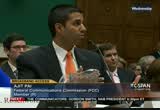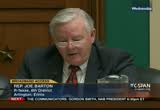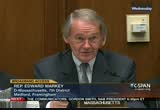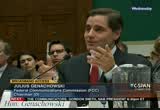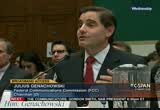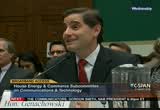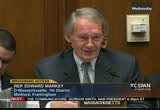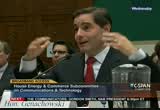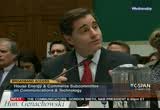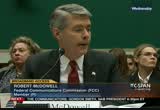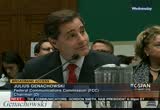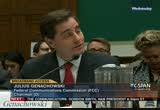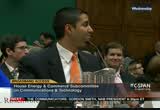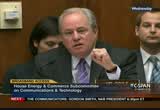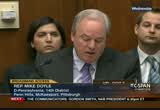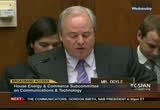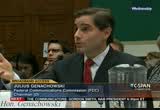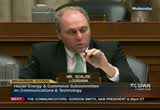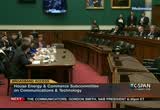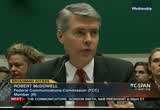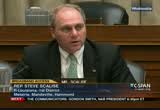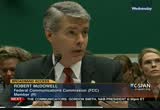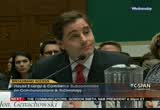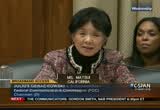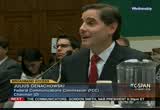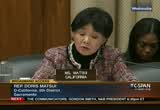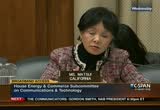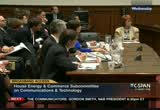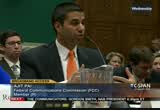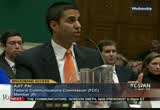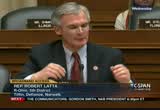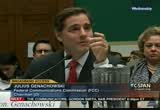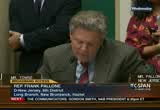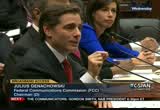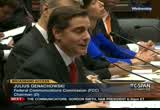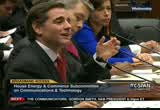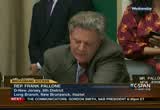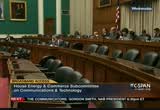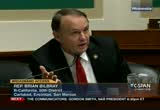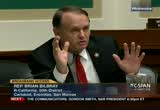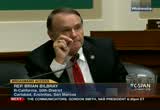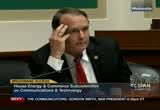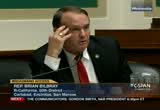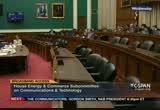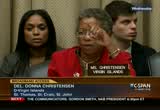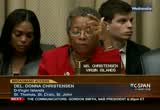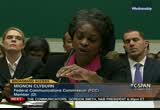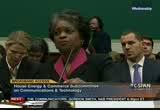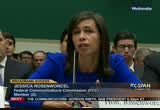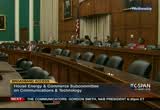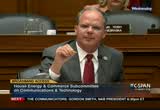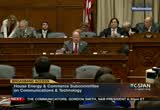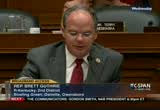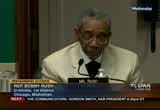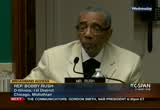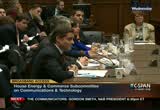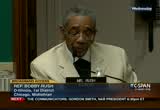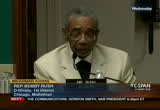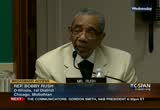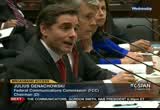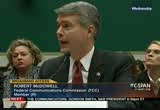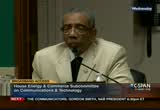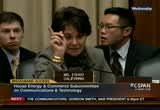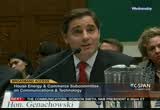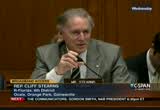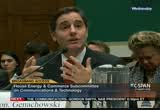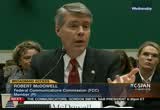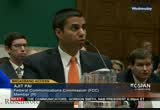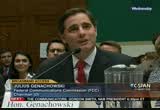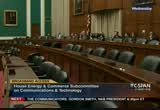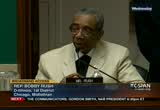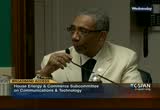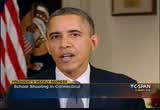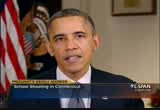tv Washington This Week CSPAN December 15, 2012 2:00pm-6:30pm EST
2:00 pm
time on a broad education? we need to be very careful about this. it may have longer time to an educational system but have really important and fax in which we have not realized efficiently. >> 1 issue that has come up is the work you have done. there has been a lot of excitement as a tool to really learning a larger group oftherel be distracting from education.
2:01 pm
2:02 pm
what weighs will we see based on the experience of these mass courses. how can that transform in cambridge and boston. secondly, we see it as a way to get harvard ideas and harvard teaching out to a broader world and way to accumulate a lot of data that can be an extraordinary resource for anybody who like to use that material to ask questions about the nature of human learning and how it ought to be structured. on the point about spreading learning to the rest of the world, i have a very moving reaction to one bit of data. one of the pilot courses. when i was in india, i met with
2:03 pm
people in india who were wanting to interact with harvard. there is a need for engagement with our schools public health. we have enormous challenges in that area. i was talking to these individuals about what kind of courses we might involve them in. this online course that i described steele has overall more than 40,000 students and
2:04 pm
9000 of them come from india. last january i was thinking how can i put people together and what programs onemight we run? this is dazzling. i would like to get a map of where they all are in india. i do know based on another conversation last week that 150 of these people in mumbai got together last week and said we do not want to be a virtual undertaking. we want to talk with each other. there is a flash mob of epidemiologists as they came together. >> a different type of flash mob.
2:05 pm
there's so much talk about s.t.e.m. and the growing number of students. the market run normally are you optimistic that we'll get more and more students given harvard's experience? or is there something we should be doing more? >> of both things are true. we're seeing many more students interested in science. we're seeing the doubling of the engineer concentrators within the last three years. 29% that enter this fall were concentrated on life sciences. we have been were he on how to
2:06 pm
teach science, getting kids involved in research early. that is one way to get them engaged. they are engaging in persisting in science. then there are questions about how do they understand there opportunities? going back to this area a basic research, as we look at funding. how do they think about this life of going after in list uncertainty about whether the life of a researcher is possible.
2:07 pm
i worry about the choices they will make. we are doing a good job getting them up. are also questions about how they sort themselves out into careers and have a huge that region and how they use that knowledge. he asked every day about how they use that knowledge. you asked about k-12. if we do not have science teachers in k-12 some small percent actually have training. a lot of our students are going in to teach for america.
2:08 pm
>> i'm going to ask one more question and then turn it over to the audience. my last question will be on immigration. you have spoken on the need for the dream act. can you talk about that? >> what first drew my attention was my first year of president a group of students came to see me, about 12 of them. they were all undocumented. they said we want you to support the dream act. they describe to me their lives. i was just stunned by their stories of growing up usually in the southwest or the west in families where they had no idea they were undocumented. then there came a moment with the needed documentation and they realize they were not citizens. suddenly they were thrust into this awareness of a whole nother world of not flying on planes to get back from vacation
2:09 pm
or not going home for vacation at all because they cannot travel are not being able to imagine medical school because they needed documentation to do that. i thought this is awful. do you come to this question as a human rights or as an economic development? both. here are these extraordinarily talented students who ought to take on the world and they worry that when a car comes near them that they are thought to be picked up and deported. i thought this is horrible. the world seems to be speaking out on the dream act now. i hope we will see real progress in this area. students are worthy of this. it is a human right for them. it is so important to have a
2:10 pm
welcoming immigration policy. that is what built our strength. we see the contributions of immigrants make to the innovation in economy. something like 40% of the fortune 500 companies were children of immigrants. there are all these ways in which innovation and immigration have been tight. we need to support that. >> we did a report recently that demonstrated it to be $329. a lot of that is because people would feel free to engage. with that we're going to turn over to questions.
2:11 pm
we have a few moments and then we will be ready for our next panel. if you could provide your name and try to make it a brief question that would be great. >> i am a sociologists. i've worked and higher education. i question has to do with finances. what are the challenges you face? in an economy with challenges, how can young people from non affluent families afford college? it would be good to hear some of your thoughts and how we can enable it. >> we look at what a variety of different institutions can do. we have made significant progress on the price of undergraduate education with a financial a policy we have introduced over the last decade.
2:12 pm
60% of our undergraduates are on financial aid. society has to ask questions about what is the public nature of the educational enterprise. we have taken are strong universities and significantly reduced in their support for public higher education. if we look at our public right now, around 10% comes from the state. what are the implications of that for our society? i think this society ought to
2:13 pm
increase education as a public good. we have been backing off for that at a time when the competitive forces have only expanded. this greatly disadvantaged is the united states. that is part of this a question of what are the students needing to do. >> the industry is well aware that this great resource at the university. universities have been clobbered it to an extent. there also dangers.
2:14 pm
i wonder how harvard policy toward these arrangements with industry has evolved. he mentioned the public. they do not have the resources harvard has. what suggestions do you have for the nature and extent of cooperation? >> i see it as related to the reports. he urges that the industry must invest more in higher education. i had a conversation with him saying we are free riding a bit. i think that is terrific. i welcome the attitude. you have pointed to something important. one set of this has been to encourage the transitional aspects, to set up a transfer office that is much more engaged into marketable products to
2:15 pm
connect our faculty with opportunities to commercialize this more directly. then there are institutional partnerships. we need to negotiate how we move into this territory. this is a new territory for many of us. we have principles of academic freedom that we wish to sustain. industry has a need to process for its investment.
2:16 pm
we need to figure out what the overlapping is. is it buying complete control? i think that would be a hard one for universities to swallow. one of the things we are wondering, the property we own over the river, one of the commitments we are making is to an enterprise zone where we hope to have some private endeavors side by side, maybe even sharing harvard scientists. that creates an ecosystem of sharing and translation. you are right. there are certain aspects of contrary missions we need to resolve.
2:17 pm
industry needs us. >> we have time for one more question. this will be the last one. >> we have been talking a lot about s.t.e.m. this morning. your background is in the humanities. if you look at funding from the 1970's compared to funding today, proportionally if we were at the same level as it were in the '70s the budget would be over $1.2 billion. what does the national disinvestment do to the humanities?
2:18 pm
>> i went around with a filmmaker who was at various venues. people want to talk about the ideas. there is a huge appetite for what is war? how do we understand this? i felt this was an example vacation for me as to what the humanities can be and do. i embrace what you say. i worry about the decline in humanity concentrators even in institutions like ours. there are some places where the humanities are expendable when we have to constrained resources.
2:19 pm
i think we do ourselves a terrible disservice as a country. it does not focus on how to get where it needs to go but knows where it ought to be going. that is a fundamental obligation. >> a great ending to a great panel. thank you. [applause] i'm now going to invite al hunt to come up and introduces panel. in the last session i said gene sperling would be joining us after this discussion.
2:20 pm
>> at the same event, a former adviser said resulting fiscal cliff situation is of utmost importance right now. his comments came during a forum titled "investing in the future." this is 55 minutes. >> that is a really tough act to follow. i am al hunt. i am delighted to be here. let me tell you one quick story about our host. when i met neera when she was policy director for hillary clinton and barack obama, i did a column or i refer to her as the sugary ray robinson.
2:21 pm
he was a pound for pound the greatest boxers. she was the sugar ray robinson of policy record. everytime i see here i say "hi, sugar." when my younger reporters heard this and it to a colleague "it is just a different generation." i am sorry, sugar. what i'm glad you explained that. >> it is terrific to be here. what a great panel. glenn hutchins is the founder of silver lake. he is a tremendous asset at harvard as a great adviser. his real claim to fame is he is
2:22 pm
the part owner of the boston celtics. if we start to in any way need to but the more we will talk about that. jonathan teaches at the university ebbs pennsylvania. he has written 150 books. i say about pat moynihan that he had written more books than most senators have read. i am dazzled by that. he is also a senior adviser at the center for american progress. he's very interested in the subject. susan, we have to stop meeting
2:23 pm
like this. we have done more seminars. susan has been a rock star -- >> since you used to yell at me over the crossfire. >> the think it is and the only past seven years. she rose to leadership. she left a real mark. she runs google's washington office. she's always been on the cutting edge of things that really matter. let me start off by saying i do not think there is an anti- innovation caucus. i do not think there is anybody who is opposed to innovation. it is a little bit like apple pie or rg3.
2:24 pm
let me ask you all to describe what we really mean by innovation. what are the two or three priorities we ought to really be talking about? glenn? >> let's start on that side. >> i thought you'd start on that side. >> i go to my right first. >> there are three types of innovation. one is scientific innovation that allows the second innovation which is the technology innovation, to take the underlying discovery and commercialize its, turning it into a product that can be used for consumer customers. what is equally important is how you can then take a discovery, it turned into a technology, and you can deliver it in a way that allows you to build a business that gets you a margin that can support the
2:25 pm
business. basic science innovation, technology innovations, and business model innovations are the ones we think of. google is a good example of all three. i was on the board of a company [inaudible] they had about $13 billion in revenue. that revenue came from products that were 120 days below last told. they have to reinvent nearly $13 billion in revenue in 120 days. disk drives are the file drives on any technology you have. the innovation has to curb at
2:26 pm
all three levels for it to continue to deliver. one of the major reasons these devices are so small a powerful is because of the process. in storage, the rate of change is to double every nine months. the point is in the technology world to have to think about the companies. you have to think about the company's to stay ahead of the curve. >> do you want to pick up on this? >> not fair.
2:27 pm
>> i do not know how to innovate. what strikes me about innovation -- richard virus turned into - an understanding of hiv aids. think of the internet -- it turned into the web. there is a myth about americans that we only care about innovation. the founders had innovation in the dna. the articles of confederation required standards of weights
2:28 pm
and measures. the most undervalued industry is the embodiment of this requirement. we need to have government investing. the founders understood that. hamilton was in favor of prizes for innovation. some of it is about money. an open society in which we can exchange ideas. standardization. what are we talking about when we talk about a fundamental measure of a basic material that is going to be part of technology? the money is very critical. we have a problem with respect
2:29 pm
to an old model in the life sciences and applied sciences. this is a problem. i am on a panel for emerging technologies. advanced technology developments. this was news to me. it is not about hardware but about systems and components. industry has something to learn from what is happening in the way the defense department is mulling the development of new technologies from basic sciences. >> i have been working for google for the last eight years. larry and sergei were brought together to create google. private industry.
2:30 pm
google is the epitome of the with the forces come together to create what i think is an innovation now. one thing you have to learn is he wants you to have a healthy disregard for the impossible. that is something that took me quite a while to shift my brain to work that way. i want to bring back to what president faust was talking about.
2:31 pm
what concerns me greatly because of the house the disregard for the impossible and working with educational institutions, i have great concerns for where we're going as a country and i will give two statistics. some of the numbers i have learned -- the united states is ranked 52nd in terms of the quality of the math and science education. that's something i think we need to focus in on. we are still number-one in innovation.
2:32 pm
i do not know we can say we need to focus only on stem, though clearly we do and especially for females. if i thought the congress was male dominated, i'm sometimes one of the only females in the room. what i think of innovation is a healthy disregard for the impossible. once we get to higher education, we are not in the situation. i do think if you talk about a healthy disregard for the impossible, you need that early attitude in the grammar school and elementary school level in
2:33 pm
the humanities if they are going to have that healthy disregard to promote innovation. you have to learn to think outside the box. >> we want to talk about what role government can play to facilitate and not impede innovation. how important is that to businesses and job creators to get this issue resolved, or is this indigenous washington and it doesn't affect those groups much? >> being in washington is being in a town with it healthy disregard for the possible. [laughter] >> i set you up for that.
2:34 pm
>> what government can and should focus on is things in their control and are important to get done. outside of government control even though it is important to get done. the most important thing right now is selling the fiscal cliff. there is nothing more important today than doing that. i have met with the president to talk about that. i am involved in this issue. there are huge market consequences if we don't get that done. now i will move on.
2:35 pm
>> if it is done -- >> necessary but not sufficient. i have never been with bain capital. [laughter] i will give you some reflection. i just came back from a week in brazil. the u.s. would have just grown faster than brazil in the most recent quarter, 2.4%. i raise this because you go down there and talk to business people about why it is. we could have made little more taxes here and a little more regulation there and cost of labor there and a fair amount of uncertainty about what we'll do in the future. they have taken the steam out of it.
2:36 pm
this is a fragile and requires government to facilitate rather than layer cost and uncertainty on top of it. with that uncertainty and a very aggressive regulatory agenda which has caused uncertainty around health care costs. you add that up and you have a period in which american business is operating under a huge weight. government rates the conditions where businesses and scientists can have the freedom to get the work done. that is an important thing to
2:37 pm
think about. government can create the conditions under which the cost is listed to allow businesses to innovate. >> if i could follow up. i thought this was amazing. u.s. firms spend 36% to comply with regulation than larger firms. the small startup and that is what we are looking for as we look for the next debate economic success story. that is the start-ups.
2:38 pm
we look at what a web presence can do. the regulatory barriers have such a depressing impact on the ability to get the job done. it doesn't have any impact in terms of the cost. >> let me fill in the blanks. there is a clear agenda that is in front of us. i think we'll have the conditions with the fiscal cliff behind us. the first will be immigration where we can solve the whole immigration problem. people say, how do we compete with china? we can have the entire world at
2:39 pm
our disposal and start businesses. then we have to focus on tax and the corporate tax reform to get a system that is simpler and makes it easier for businesses to compete in the world. that will be enormous. there is an infrastructure investment that needs to be made. this is important with the budget deal going forward. we have to think about what our values are. we can spend money on infrastructure to make investments in the future rather than having short-term spending. support for basic research and for higher education, as drew
2:40 pm
talked about. tell us what is and we can plan around it with respect to health care costs and energy costs. then it businesses can create a renaissance of american competitiveness. >> i think that is a brilliant agenda. i don't think that has changed. let's assume we go through the fiscal cliff. immigration, investments. you are not going to do a dream act. we had a chance to do it. george bush, john mccain. maybe the republicans learned a lesson.
2:41 pm
i covered the 1985-1986 act. they have the most skillful treasure secretary around. when its top about infrastructure spending and things we have done with nih, all the talk now is about debt. how do you do what glenn envisions? >> we are not going to get away from someone of a doomsday scenario for quite some time which would allow us to get to
2:42 pm
glenn's position. i do think it is importance. the priorities -- people don't have a disagreement about whether the federal government should have a role in immigration or in infrastructure. there are larger conversations out there. we accept these as government rolls. i think what glenn has talked about and how do you get there? the united states congress and the white house is very disjointed because the american public is very disjointed. this is a town that is responsive to what their voters
2:43 pm
tell them. we would hope when it requires leadership that they rise to the location. if we get to the point of these things that need to be done, more people need to talks about it. i think it is a campaign that needs to be waged and probably in the center of both political parties to have that conversation. >> it is a lonely center. >> it needs to be talked to and explained in terms of what needs to be done. i do not think that is something that will happen tomorrow.
2:44 pm
political parties are scared about how tumultuous politics is. the pendulum is swinging. i think they will respond more quickly if we can get that message out there. it has been so long since we have had this discussion. we talked about the government investing in r&d and what that means. >> can i just mention? >> the whole dialogue has shifted. there has been efficient government. you were in congress 20 years ago.
2:45 pm
the budget was doubled. that was a great investment. that is not part of the dialogue this year's. >> it is 19% of what was 10 years ago. we tried to do science agencies, a doubling in 10 years or so, which i hope can be done. the best thing is to get around 3% ideally. we are not moving in the right direction. i am a first generation american. my father got here in 1926 partly because he owned a patent. this will company in ohio paid
2:46 pm
his boat ticket so he can get here. he did happen to go into that business. he became a psychiatrist. [laughter] he was part of the growth of the great american middle class. this isn't just about rich people and greeting the situations of wealth. it does lift all boats. i want to go back to the humanities. the attempted sovietization,
2:47 pm
they tried to empty out the universities of historians and philosophers and they got them to go west or they exile them internally in central europe. they encourage more scientists and engineers. the founders would have known this. you need the historians and philosophers to look way over the cliff to the mountains and beyond. talking about creating incentives to do -- you have to have people that are imaginative who can look beyond the current crisis.
2:48 pm
that has been part of the american middle class, new ideas. >> i agree with that. i would like more of an emphasis on science and math. in terms of the k through 8th grade. >> absolutely. a young physicist learning how to do problem sets started going back to the questions of uncertainty and the relativity theory and became more philosophical. if you're just doing problem sets, you are not thinking about the deeper ideas or setting the framework for thinking will be on the cliff to the future. >> do you have a question?
2:49 pm
>> i fear that we have a burgeoning student loan problem in our country. it is the only form of consumer debt that has increased substantially. people don't have the jobs. look at it on an apples to apples basis. very high default rates. i worry about kids -- i study the equivalent of the social sciences at harvard. i worry about the kids that are getting literature or courses in universes' that didn't have
2:50 pm
the same level of prestige and cannot get jobs after words and are repaying those student loans. it is important if you have a good idea to be able to communicate it. we need to think about people's employability and not people that went to stanford and harvard and other kinds of schools and a great conditions where they can have a personal balance sheet that allows them to prosper in their lives. >> no question about that. everybody needs to think and to write. that is what you get from a liberal arts education. >> you have the terrible squeeze. harvard does a fantastic job.
2:51 pm
a kid will end up with $100,000 in debt. it is a terrible squeeze. >> some of the work being done to integrate and we talk about the dangers of universities and businesses getting together. one thing we can do is create the ability for the schools at all levels to teach kids things that local employers need to be employed. then teach them something about shakespeare and the constitution and make them good citizens. give them skills that allow them to support themselves in the marketplace of the future.
2:52 pm
>> community colleges have been an engine but we're cutting back on community colleges. >> we talk about the full range of this. support of universities. more money is better. a business person thinks less money is better. today it is cheaper to start a business because all the tools are now available on the web. we have taken the cost of innovation down enormously. there are ways in which we can reduce the costs and reach many
2:53 pm
more people and create the opportunity for kids to get the skills. we think education stops some time in your 20's. 40% of the work force has been unemployed for more than a year now. we can use -- we can do that in a much different way with more connections to industry. >> i want to follow up. onre spending more money education, particularly in the primary schools and yet our science and math have flat lined. the kids are doing the things they have done since the 1970's. i'm not familiar with education x.
2:54 pm
google is studying ap classes' to see what we can do better. when we talk about education and so many of the social problems that we've talked about. there has been such a dramatic change and we've not done anything to andup end our educational system, particularly in the elementary schools to see if there are ways to use these online resources to reach more kids and to do the types of things you are talking about and to introduce them to world beyond our borders. there are ways to shake things up and to allow kids to enter
2:55 pm
world that they have never been able to enter through technology. we need to spend more time figuring out how we change that paradigm as we know it. how can we learn better based on what we know today? >> let me try two more. warren buffett says the tax rates did not matter as much as in other people pretend when it comes to companies and investments and innovation. i suspect you disagree. >> the buffett rule would suggests tax rolls are important. business people oftentimes say that.
2:56 pm
you get one level analyst beneath that. in the calculation is a whole line of things like taxes and other costs. you get different outcomes. they are not talk about. you are looking at broader conclusions. >> taxes are embedded in the analysis and people do not recognize that. we have a corporate tax code. we can get the revenue today and be able to deal with reform that is revenue neutral tomorrow.
2:57 pm
no one is talking about getting revenue from corporate taxes. a whole bunch of features of the corporate tax code which significantly influence corporate behavior. it is not about revenues. every year, something has been added. like the house you buy with three different plumbing systems. it is time to do the gut renovation. everybody talks about the cash. in lot of this cash is offshore -- a lot of this cash is offshore. a whole bunch of reasons why
2:58 pm
that is. it is an example of a big outcome of difference. that's not the ideal thing from a theoretical point of view. one thing, the see a lot of american companies buying foreign companies because they are using 65-cent dollars to make acquisitions. that is an example. there is a distortion that would
2:59 pm
be ideal. >> one final question. a couple of things you would like to see the government do. what other areas do you think government could do to better encourage and facilitate innovation? >> i will not talk about spending more money. i would like to see more investment than is in the president's budget. there is one think that government can do and our leaders have not done very well in many cases in the last 10 or 15 years and that is say good things about science.
3:00 pm
the life sciences have become a cultural flashpoint. you will not have a great economy in the 21st century -- we have a convergence of engineering and artificial intelligence that requires that we have a strong life sciences base. there has been some issue with respect to the stem cell issue that has discouraged people in the sciences and a feeling that our leadership is not saying the right things about the importance of science. >> and perhaps encouraging some young scientists to go elsewhere. >> there are some scientists that feel as though there may be
3:01 pm
a future in those fields. >> we have time for a number of questions. >> i want to jump in. i do think getting over the fiscal cliff, the deal getting closer to balance the budget is still very important. i do hope because of the discussion that tax reform is something that is taken seriously for this year. i think that is well overdue. there is not time to do it before december 31. it will give businesses a lot of assurances that the government is paying attention to what they are saying.
3:02 pm
>> you should tell barack obama to find a jim baker. >> think about each time we have reached a crisis point in our country there's been an institutional response to it. we created a central bank. that has proved to be enormous for the past five years and important for years before that. post-world war ii, we create a system and the department of homeland security. i wonder if there's not an institutional -- >> some did not work as well as others. >> that is exactly right. it reflects our values and the
3:03 pm
focus of the government. we should have a department of homeland prosperity. we need somebody other than the president to think about american competitiveness. something we've taken for granted because we were the premiere at economy in the world. we to reinvent ourselves -- we need to reinvent ourselves. >> we have a bunch of questions. do we have a microphone? the judgment on the end. >> hi. i had a question for the panel
3:04 pm
and the president of harvard. looking at demographic shifts. you are talking about innovation. the application of some of your technologies and innovation. people utilizing technology to boost their awareness whether they are musicians are using google or youtube. how do you see people taking advantage and that are not graduate at a high enough rate but have the ingenuity? i have covered these people to a 50 cents to a jay-z. people are forming at the wayside but present a challenge moving forward because these will be the majority of children coming out of the demographics where outcomes are
3:05 pm
not to the level of being able to apply to a harvard. >> i cannot disagree with your underlying assumption. we have performers who would never have been able -- performance, thinkers, people who want to provoke discussion -- would never have the platform before and now it is fair and it is not costly and it is the great equalizer from a musical or idea perspective. i think this is something that will accelerate. i do not have the answer to the equalization and education. we will discover something that
3:06 pm
allows people -- to influence, you have to have a channel of communication. there is a channel of communication to almost everyone in this country via cell phone. how you do it -- this conversation of communicating the way we think and how we can use our mobile devices to reach those kids that might not have the structure that we have been thinking about influencing. so i do not know the answer but i know that technology is there and somebody has to do a little more social science in terms of how to take advantage of it. i do think the future use the opportunity for us to stake their claim because we are in this era of equalization with regard to an ability to access information and to get the message that the world is yours and you can do it.
3:07 pm
>> that is one of my interests. we have seen this before. bing crosby was a crooner because the technology changed. there is a magnetic tape. you have to go to chicago or new york to record. i'm an old-fashioned guy. i still want all those kids to come to a seminar on a campus. i am teaching a course next year and i'm trying to figure how to get my 50-minute chunks -- 15-minute chunks. we have a question there. >> i'm carol thompson.
3:08 pm
i have a question for each of the three panelists. we have been talking about what we were hoping for the future. what are your greatest fears and greatest hopes for 2016 and 2020? it is a small question. >> i presume you don't think the world will end december 21. >> susan will not say newt gingrich will run again. >> did not come to me first on this one. >> wow, my greatest fear? i hope my kids are well employed. they are doing ok. they are in their 20's. my greatest fear -- i do not think about fears. i'm surrounded by so many incredible kids that i feel good. if i feel bad in the morning, i
3:09 pm
3:10 pm
3:11 pm
in the technology world and you spend your life thinking about the future. in the labs are products and services to be introduced in the future. we think about the future all the time and understand it is a complicated process. i went to a thing at the world economic forum and all the ceo's of major technology companies were talking about
3:12 pm
what they saw in the future. everyone was something interested in second wife and no one mentioned facebook -- second life. you cannot predict what form it will take. i hope that is what happens. some innovation that we do not expect and some innovator, a young lady trained in the great science curriculums great something.
3:13 pm
>> why don't you close it out for us? >> let's put aside all the other things that need to be said -- iran, north korea. the you see staff -- the easy stuff. what does keep me up in 2016 is the fact that i have seen through my lifetime women change -- the face of women change. women are the majority of graduates in most colleges. 25 years ago, they were not allowed to get in. medical schools that allow women to get to where they need to be. i see this issue that we have
3:14 pm
with young girls in math and science. i think for all the advancement we have had in becoming equals, when we get to a place where it technology rules, it will rule education. this is the world in which we live. we will be living with another glass ceiling that our daughters have to break through. that makes me sad for my girls and their friends. >> ending that on a positive note. >> this day today was brought to buy neera, susan, and the president of harvard, all females. >> my wife let me keep my name. i want to thank all of you. everyone has been terrific. we get to serve as advance
3:15 pm
people for gene sperling. thank you. [applause] [captioning performed by national captioning institute] [captions copyright national cable satellite corp. 2012] >> gene sperling also discuss the fiscal cliff and reemphasize the administration's position on higher taxes for the wealthy. this is 40 minutes. >> now it now it is my great privilege to introduce gene sperling, who is the director of the white house national economic council and assistant to the president for economic policy. gene also is a former senior fellow at the center for american progress where he wrote "the pro-growth progressive," where he talked a great deal about the connections
3:16 pm
between innovation, education, ensuring that we have an economy that works for everybody. i want to say that i am certain the administration -- there is nobody in the administration who is more focused on america's long-term competitiveness, its short-term competitiveness, its mid-term competitiveness. when the president is talking about his vision for the future, america maintaining its edge in the global economy, and how it also does right by all of its citizens, from its senior citizens to students to people who are dreaming about being the next generation of innovators, gene is at his side
3:17 pm
talking about the policies that will help achieve that, from higher education, k-12, ensuring that our universities are still leading and our citizens are well trained. when it comes to a subject like human capital, maybe not the best term for ensuring that our children are achieving their dreams, gene has been focused on that set of issues. not only here at cap but at brookings he did work on education with girls around the world. he has written extensively about education here in the united states. he is enmeshed in the debate around the fiscal cliff, but we brought him here today to talk about our long-term challenges
3:18 pm
and how we connect the dots, and our wide-ranging discussion helps set that up. with that, gene sperling. [applause] >> thank you very much, neera. it is intimidating to have followed your panel. i like much more when you get to talk first, be the first person to mention every idea, and then the panel's say, yes, as gene sperling said. [laughter] now i have to go after the president of harvard, jonathan marino, john hutchinson, susan molinari, who is partners with my wife on issues of child trafficking. she has a special place at our home. i know a lot has already been said. since i did not get to hear it all, i don't know whether i will be repeating it again. anyway, let me i'd like to start when we talk about
3:19 pm
economic policy, particularly in this area, by reminding ourselves, what is part of our goal for economic policy -- because you hear a lot of metrics on the gdp, on growth, on productivity, etc., as if those were the ends themselves --those are the means to our ends, and the ultimate goals of economic policy, which to me are, are we a nation in which the accident of your birth does not determine the outcome of your life, where there is a real chance for everybody to rise? are we in an economy where growth strengthens and broadens the middle-class, so there is not only security for the middle class but an ability that those from other countries, and those that are poor, can move up without pushing anybody out? three, are we in an economy and country where people who work hard and take responsibility for their lives can work with dignity, raise their children with dignity, and retire with
3:20 pm
dignity? those are our ultimate goals. everything we do is measured against those. innovation you can define many ways. you can define it as the commitment to combining technology and skills and other inputs to have bottomed out -- to have better methods and processes for productivity. you can define it as a commitment to fdr-like commitment to bold experimentation. or an investment in the building blocks for building a 21st
3:21 pm
century economy, education, research, and infrastructure. in the end, i believe if you are a progressive, the way that i believe we have to look at it is that it is fundamentally a commitment that we want to embrace change, and we want to make sure that it works in a way that furthers, not works against, those basic values. in addition, change, productivity that leads to hollowing out the middle class can give you the same productivity growth, but it does not meet our goals as a country, which is to be a country of shared prosperity and a broad middle class. my view, and the book i wrote back when, and more importantly, president obama's view, is that if you are a progressive, you need to be at the forefront, you need to be embracing change but shaping change so that it is meeting those basic progressive values we talked about.
3:22 pm
i think that the president well knows that we cannot assume that that type of push towards technology, globalization, innovation, however inevitable, will automatically lead to the type of shared growth we want, that there is potential to have those types of changes lead to winner-take-all outcomes that are not consistent with shared prosperity and, as he says, an economy with growth built to last. our question is, not how we put the brakes on, but how we put
3:23 pm
the engine on innovation and change, but we do so with the ultimate issue of whether it is promoting the fundamental sense of shared prosperity and a stronger and more inclusive middle-class. i think that the issue of the progressive taxation is not at all irrelevant to this. when you think again that we do have an economy that is capable of having more winner-take-all outcomes, in that context, progressive taxation is not about redistribution, it is not about populism, it is not about punishing success in any way, but what it really is is about a national commitment to essentially pay it forward. to recognize that those of us
3:24 pm
who have benefited most from the innovation of the past, who have benefited most from the investment of the past, have an obligation if we are doing well to pay it forward, to make sure that we are giving this generation and the next generation the same building blocks in terms of education, research, modern infrastructure so that they have the same chance to grow and prosper. in that sense, paying down the deficits while still investing in the building blocks of innovation is not about borrowing from the future. it is about investing in a richer and more prosperous future. i think that is the overall frame with which we go forward. i do believe that there has been
3:25 pm
a greater belief that we do have to embrace change, that the processes of innovation and productivity and technology and globalization are not things to be stopped, but things to be embraced and shaped towards the progress of the values we hold dear. now, i think one thing when you're talking about innovation, you are essentially, to me, talking about a commitment to evident innovation and accountability. and a commitment to pay more resources behind innovation and then continually test that for results. i do think when we call for more accountability and evidence based violations, it is important that we do not allow programs that are for poor children to somehow become the victims of a double higher standard. i have seen this too many times. when a research strategy for cancer goes awry, people say, let's evaluate it, let's figure out what we did wrong, and let's do it better in the future. they do not say, well, the whole idea of trying to cure cancer is just a waste of money, the federal government should
3:26 pm
not be involved in that. unfortunately, there are times when people talk about investments that help our poorest children or helping people in our toughest neighborhoods, some of our most intractable problems, dealing with young people rescued from trafficking, these are very difficult problems, and we should evaluate and see what works. we should also insist that there is not a double standard so that if an evaluation, a single evaluation, or even a couple
3:27 pm
evaluations, somehow show that a particular strategy has not worked well, that that is the motivation to do things better and smarter, not an excuse or reason to say that government has no business being involved in that endeavor. i think we need to be for change, accountability, evaluation, but not a tougher, higher double standard just when it comes to young people from the most disadvantaged and troubled environments. there is so much to talk about in the innovation area. and i'll just mention a few things that we are focused on, and then we can do some questions. one, on the area that i feel that you have been talking about, on a skilled workforce or whether and how much there is a skill gap -- i think this is a critical issue. i think that for us to have clear policies, we probably need to be a little bit better in the defining challenge.
3:28 pm
first of all, i do not think there is any question that the main reason we are having higher unemployment right now is not structural. it is fundamentally cyclical. it is fundamentally a lack of demand that is still in our economy as we recover from the great recession. that said, that awareness, that recognition ben bernanke and a former bush a chair have embraced, that our problems are about demand rather than structural, this should not undermine the fundamental importance of dealing with skills or that we may face temporary or future skills gaps. i think there are three reasons why we should be focused on this. number one, even the unemployment today that is fundamentally about cyclical demand, less strength in the economy, can easily become the next structural skills problem of the future. we know that one of the challenges we face right now in our economy is not just lowering unemployment but lowering long- term unemployment, and we allow legions of our fellow citizens to stay unemployed for one year or two years, we know from study after study, that they
3:29 pm
will have more trouble reestablishing their skills going forward. that would be a humanitarian crisis for us as a country, but also we would also be sitting by and letting a structural skills gap expand because we're not taking enough efforts right now to get people back to work and to deal with long-term unemployment. second, there is clearly some immediate skills gap issues. you hear it in engineers, welders, and we should be focused on that. third is the long-term issue, which is really, since you're talking about the future, it is less of a current skills gap and more of a supply side issue. we should believe that we have a large enough supply of skilled workers, the field of dreams notion, if we had that degree of skilled workers, it will help location of jobs come here. we will be more of a magnet for the high skilled jobs of the future. i think that when we are looking at this, we should, in our policy solutions, make sure
3:30 pm
that we are defining policies right so that we are having the right solutions. sometimes when people are saying skill gaps, they are talking about too few of the absolute top of the top engineers, technicians. those are issues that people often talk about, helping to address right now with high and then sometimes they're talking about skills gaps where there's not a strong enough connection between how we can do worker training and the skills that are actually open in particular areas. and all three are important but they do not take with them the policy solutions. in places can help all of us by
3:31 pm
helping to define these issues and define which policies address them. and i would suggest that we will be strongest when we have a larger skills compact. the that is a -- it is a stronger case to make that too the american people if that is one component of a strategy. one component not just of a larger conference of immigration strategy but one component of a larger skills strategy which also talks about how we can increase the number of skilled workers coming from our country from u.s. schools from u.s. workforces together that is a skills compact i think the country could easily get behind and support.
3:32 pm
and so i think that is highly important as we think of the skills issue going forward. and i think some of the issues i heard talked about before are critical to that as well. what are we doing in the pipeline? what are we doing from the earliest ages to make sure underrepresented groups are taking to science? why do we have the dropoff at middle school around young women? what are our long-term strategies? so we have to attack this on all silledders we have to have an all the above strategy. butwhile we're doing the long-term strategy to have a greater supply of stem workers and high skilled workers we should not take our eye off what queck dot do in the short terms. one of the most powerful was the idea that you could have a significant effect on the number of workers we have if
3:33 pm
you just ensured that you had a higher graduation rate among those who declared a stem major in their freshman year. taking that from 402060% would have a significant impact. and that's not about 20 years from now. that's about two or three years from now. so i think we can attack this on the short and long term. the second issue on innovation. very important to us and this president. is on the overall issue of research basic research. i think this is a critical issue for us. we as a country have long been committed to having a strong research agenda and we know that the areas where the private sector will underperform is on basic research and blue sky research. that's where nih, arpa e have come in. and to push my head into the
3:34 pm
budget issues for one second i think there are a lot of people who come to talk to us at the white house who say i care deeply about whether you're doing enough on energy and advanced manufacturing research, deeply whether you are going to help nih push us through the next front tiers of alzheimer's' and other biomedical research. and then say it's not really my business to worry about whether we are cutting too deeply. and investing in early chood and investing in skine and stem education. if you are indifferent to whether or not we reduce our budget deficit by simply taking deeper and deeper cuts in the domestic discretionary budget at some point you get to a point where you are simply
3:35 pm
trading off between early childhood and biomedical research and higher education. and those are not trade-offs the american people wants us to make. so we need to have when we talk about having -- getting our fiscal discipline, our fiscal house in order, i want to remind people that when i was here in the early 90s one of the clarion calls one of the reasons why people made that case was that if we had expanding deficits it wasn't just that we would crowd out private capital. it was that we would crowd out our public investment in the future in children, in modern infrastructure, and innovation. so when we decide we're going to cut spending, which we need to as part of a larger deficit reduction agreement -- those of you who care about innovation need to care about how you cut, how you reduce spending. we have already cut domestic
3:36 pm
discretionary spending to its lowest level since the eisenhower administration as a percentage of our economy. that is something the president felt was necessary in these extraordinary times. but to cut another 10 or 15% will make proposals being suggested to here a muth moot point. so i flag that for everyone. the third issue i'll talk about before closing is just is manufacturing. this administration has made manufacturing a priority. and we are very aware that when you focus on manufacturing there are some who will take a more classical view economic view and say you cannot have a preference or you cannot care more about any particularly part of the economy because then you're picking winners and losers. you're putting distortionry dead weight loss on the economy. and i want to make the economic case for why we feel that is
3:37 pm
not right. first of all, let's consider research and development. research and development is an area where there is now strong bipartisan support that there are significant spillover benefits that go beyond the particular company doing research and development. we support our universities, do basic research. we give the rd tax credit to our companies because we believe that there is a benefit in innovation and growth that happens to our economy when that happens here that goes beyond the specific benefits of the individual company. and i think that manufacturing for us done right done smart has that same justification. number one, manufacturing does punch above its weight, 90%, 70% of private research 60% of exports come from manufacturing. secondly, location matters. studies show that when a major
3:38 pm
manufacturing plant comes into an area, the productivity of the near by manufacturing also goes up. there are positive supply chain and eco system impacts that again go beyond the particular company. and so we have papers on this. but for those who take more of the knee jerk review that argument that anything for that stresses advanced manufacturing are the importance of location is somehow just a political or distortionry economic policy. you should look at the increase in strong academic evidence that suggests location does matter and that it is right as a matter of public policy to want to have more manufacturing location in the united states. note how many companies are moving their production and their design specialists
3:39 pm
together in the same building on the floor why? that he think it matters. bell lab they think it matters to have production and design together, that there is a greater innovation benefit that goes on. the next point too which the professors from harvard make so well is that when you have an overall supply chain in manufacturing when you suffer a period where that manufacturing base is eroded it is not just a temporary thing. it affects our ability to compete for the next level of high value added project. and their example is when consumer electronics where it might have seemed at one point that it was not such a terrible thing if scommurem electronics were produced somewhere else with lower cost labor. but what they argue is that eroded our ability, our base to
3:40 pm
compete for what became the more high value added consumer electronics of the future. but if that's the test case for letting your manufacturing base become eroded then i can we can feel positive that what happened on autos was the opposite side. the fact that the american automobile industry has -- was saved or helped save itself with the help of president obama and the workers and the people there is obviously part of our manufacturing success story in the united states now. it may have saved over 1 million jobs. but i also think it's very important for the future. nobody doubts that the united states automobile industry is now positioned to compete for the future jobs, which would not have happened had we let that, the entire supply chain become eroded. i always thought one of the most significant quotes was that from allen ma lailie at
3:41 pm
fourd because anything anybody would have been taught in their microeconomic class would have been if you had three main competitors and two of them went out of business, the one standing would have been stronger. they would be taking more market share. and would be more powerful and broader. it's striking then that ford motor company's c.e.o. said at the time, we believe that if gm and chrysler would have gone into free fall bankruptcy they would have taken the supply base down and taken the industry down plus maybe turned the u.s. recession into a depression. that is a teaching moment about the power of the overall innovative skillsset, the supply chain, and what that means for our capacity to compete when the company that would have been left standing thought they might have gone down as well. so there's so much to say.
3:42 pm
i wanted to make these few points overall perspective talk a little bit about manufacturing, about research and about skills and i'm very happy to take your questions going forward. >> i think we have time for a few questions. if you can wait until the -- christine comes around with the microphone. >> thank you. my question goes to innovation funds which you brought up. at what stage are you focusing on? is it with respect to either expansion or the startups? and then on an execution basis, what's the regional plan as far as a national strategy? >> well, i think for those of us who are in the government job you -- where you do want to
3:43 pm
be a bit like the classic economic book is you want to look to where we were underinvesting or where we have too little capital as a country going to private sector enterprises. where because individual private actors do not feel they get the full benefit from those investments. but we as a country would be richer and if there was more investments in those areas. and so i think one of the things that we are trying to look at is i think the expressions become where are the valley of death? meaning where are those places where in the innovative process for companies where they are not able to get the capital they need to be perhaps one of the gazz els, one of the fast-growing companies. and i think the hard part for -- at the government level is you have to ask, is it a valley of death because it should be a
3:44 pm
valley of death? because it doesn't make sense for the private or the public sector to be investing in companies like that? or, is it a case where there really is a market failure? where it may not make sense for particular venture funds to invest in certain companies but if we had a broader investment you would have some would prosper and we as a country would be better off. and that's where i think you look for the type of tools you have with the f dinch c and other tools to see are there areas where it makes sense, where we as a country may be care more about how many small manufacturers have a chance to grow and expand and that even if there's a risk aversion in the capital markets or if it's just a fad or trend of the day there is a strong enough purpose for us to go into. and that's something we look
3:45 pm
at, we take very seriously, and it's something that we are having discussions with karen mills, with treasury department about. and so we plan -- we're now going to be around for four more years. so we're open and eager to get people's suggestions. i will say on the regional strategy, i think one of the very strong initiatives the president did put forward was his national innovation hubs proposal. and i think what was interesting there is that we proposed $1 billion so we could do 15 or 20. and when it didn't look like congress was going to pass that the president said to us can't you pull together enough money in the federal government to do one pilot? so we did kind of pass the hat and come up with $45 million. when we put that proposal forward we received 13 partnerships. 13 tremendous collaborations. we were only able to award one that went to a collaboration in
3:46 pm
youngstown where its partners included not just case western but carnegie melon and the excitement about that and i think also the excitement that you're doing something that's regional where you have pennsylvania, ohio and the whole rust belt stream all investing together instead of the way things typically are where it's for a particular state or a particular city looking for that. or i think considering that we tested that we've seen there was enough interest that 13 partnerships would apply for that, that really shows i think the promise of this strategy which has been used in germany of these national manufacturing innovation hubs. and i think that is something that we're going to look to promote in a second term and expand further. >> over here. >> thank you. paul freedman with every child matters. we're very -- i applaud you for your comments about the need
3:47 pm
not to have us fighting against -- money for children versus money for research and other vital needs domestic discretionary budget. so the question is where do we find more revenue and have you considered taxes on stock transfers and transactions or other kind of innovative approaches where we can find new revenue that will be possible for us to not fight amongst ourselves for important ry sources? >> well, it's going to shock you and many of you to know that i am not here to make news on new revenue. we are busy fighting right now to make sure that we have a budget agreement that is very balanced. and i think part of that balance is obviously having enough high income revenues together with smart entitlement savings. that's the type of balance people talk about the most. but the other type of balance is to make sure that you're putting together a package in a
3:48 pm
way that does not hand cuff us not only from creating jobs in the short term but long term investments. so i think one of the things as i've stressed that you don't want to do is to try to go further in deficit reduction in the way the house republican budget does which is another $1 trillion in deep cuts precisely in the areas of our government where we fund early childhood, biomedical research, where we fund the national science foundation. and so many of the other drivers of innovation and economic growth. and i do think that we are -- that a challenge for us as a country going forward is in repairing and -- repairing the damage that was done fiscally from the great recession how we make sure we are giving people the confidence that we are bringing down our debts and
3:49 pm
deficits as a persage of the economy and giving people more confidence in doing long term investments here at the same time we do not starve what has been so much a part of america's history which is our willingness to invest in the future. and that investment is in our children -- all children, including poor children -- in modern infrastructure, in research basic blue sky research and i think that is when we get beyond the challenge we face over these next few weeks i think that's going to be a broader challenge we're going to face over the next decade. >> i think we have time for one more question over here. and i just as the question is coming i want to say how much we support the president's fight on ensuring there's balance. the president has been very strong on that issue and we commend him. >> we are basically a
3:50 pm
biomedical company that helps doctors and nurses collaborate better using social media. i want to ask a section about crossing the valley of death. so our company was very fortunate in that we got a small amount of innovation funding that's come through from the health care moneys but it's really a broader question about the health care eco system. in silicon valley if a company goes under all the engineers find new jobs in a matter of weeks. but in biotech we have a lot of people with phds and they're much more longer term and specialized types of areas. we don't at least on the surface appear to have the same kind of resilience and it seems that's part of an issue of eco system. say about mobile health companies having trouble getting off the grounds and getting things through quick enough because part of that valley of death is f.d.a. regulations and telecom regulations. so i was wondering if you can compare and contrast how we foster a more vibrant emil
3:51 pm
ration of the valley of death or biomedicals since we have such a pristine asset in that. >> let me make a couple of points. number one, as you've mentioned health care i feel a bit obligated to say that there's probably few areas where innovation is going to be more important than health care. and i think one of the points the president makes repeatedly is the only good solution in dealing with our health care challenge is doing things that lower health care expenditures while increasing the health value that people receive. other things you do are cutting the cost shifting they're even raising costs to try to lower what's on the federal books. but the thing that is best for our country is if we have the type of innovation and continue to push the type of innovation
3:52 pm
that lowers health care spending not because you're cost shifting but because you are showing that we can give better value at lower costs. and i think for us as much as there is the unsable focus on our -- you know, entitlement savings will be part of long-term budget, making sure that we are doing everything we can to expand and test and innovate with some of the reforms that are in the affordable care act. i hope will be a focus going forward. i realize we've been through a political period where there's been the stress on would it survive or would it not survive. now that we're past that, now that we know this is the law of the land, there would be so much to gain from not just a bipartisan effort but an effort through the entire expert and health community to look at which of these reforms are
3:53 pm
working, which of these innovations are working. because this is the true answer to our long-term health challenge. we have 40 -- when i left government last time there were 40 million people on medicare. in 2020 there will be 64 million. it will go up 60%. there will be 24 million. you cannot repeal the retirement of the baby boom era. you can't repeal that. and you don't want to provide less to people who have worked hard their whole life. so the ultimate goal has to be again this type of innovation for health care. on biotechnology i don't know if i can give you a specific answer other than to say that i think that we -- i think there is a growing recognition that when you are looking for areas of promise in the united states over the next 10, 20 years,
3:54 pm
that there is enormous promise in this area. not just most importantly in what it means for health and but for our economy for jobs for entrepreneurship. so it is an area we are looking very closely at. and again, it's an area where ideas about y you think there's negative valley of death in terms of capital for people listening that doesn't actually mean a valley of death. it just means that you get to a certain point in the formation of your company where you cannot get the financing you need. i think that's an area we should be willing to look closely at. but with the appropriate rigor. >> ok. thank you so much. i want to thank susan and yourself and the great partnership we've had with google and harvard for a day that i hope will stimulate people and remind them of the
3:55 pm
importance of these investments in the coming weeks. thank you. >> tonight we'll take a look at some of the fair well speeches by and tributes to outgoing members of the house and senate including richard lugor and representative lynn woolsey of california. that begins at 8:00 p.m. eastern heren on c-span. >> my inspiration was the idea that i wanted to explain how to toe tall tarynism happens. we do know the story of the cold war. we know that the documents we've seen the archives the described relationships between first roosevelt and stalin and churchill and truman. we know the main events from our point of view. we've read them and written them. what i wanted to do was show from the ground up what did it feel like to be one of the people who were subjected to this system.
3:56 pm
and how did people make choices in that system and how did they react and how did they behave? one of the things that happened is the region that we used to call eastern europe. these countries no longer have much in common with each other except for the common memory. this is about 30 minutes. >> defense reporter with plitcol here to explain to us how states are bracing for
3:57 pm
sequestration, particularly states that have strong defense industries and what they're doing to prepare for the cuts that could hurt their local economies. welcome to the program. >> thanks for having me. >> first, before we get deep into this discussion, refresh for us in our minds, what is sequestration? when does it kick in and why does it matter? guest: all the attention has been on congress looking to avert going over the so-called fiscal cliff. and if that happens, if congress isn't able to reach some sort of bipartisan accord people will see a lot of automatic spending cuts and tax increases take place right after the first of the year. a lot of those impacting the defense industry you look at that breakdown. kick-in date something that has a lot of folks in that industry as well as the pentagon quite concerned. and their ability to keep things up and running particularly in a handful of states with large defense industry. >> and there's no way to
3:58 pm
separate the general sequestration from how it would affect the defense industry if this happens it's a 10% across the top? >> these are across the board cuts so there would be defense is a big chunk this is also going to affect things like education, head start programs in some states, social services. so this is not just a defense issue while they've perhaps been some of the largest voices making an outcry when you look at the voices coming from capitol hill. >> you wrote over the summer in an article -- this was written by one of your colleagues with the headline, defense group sec ster harm huge.
3:59 pm
so if the sequestration goes into effect january 1st, is this going to be an immediate effect? is this going to happen like january 2nd we're going to know who is going to be affected and how they're going to be affected? >> that's one of the very difficult things when you're dealing with this. i believe there's the kind of take if this happens on january 2nd, with we go over the so-called cliff and everything goes to a halt. that's not really the case. our government is not going to run out of money after the first of the year. but it will be harder and there
4:00 pm
will be some jobs impacted as what was borne out in the story the aerospace industry done by a professor at george mason university looked at the jobs. that's going to be a gradual effect. it will not be, bang, happens and here we are now. host: you wrote an article, five states have more to lose in sequestration cuts. why are these states in the cross hairs when it comes to sequestration and the defense industry? guest: we look at it from the start -- the perspective of the defense industry. all 50 states will see an impact from sequestration. not only do these states have significant defense industries that are a large part of their economy, they are going to lose a lot of stops on the domestic side and department of defense contracts. -- lose a lot of jobs on the domestic side and the department of defense contracts.
4:01 pm
those are the factors we tried to weigh. california is on the list. it is a large state. the estimate was that something like 200,000 jobs would be lost. 200,000 jobs in california is a lot. take a state like in hampshire. the number was something like 60,000 jobs. you have to look at the proportionality and that is something that has been missed. host: we are talking with juana summers. she is a reporter with politico. if you want to get involved in the conversation, give us a call. the number is 202-585-3881 for republicans. you can still send us an e-mail. our first phone call comes from
4:02 pm
walter in indiana. caller: thank you for taking my call. i appreciate it. sequestration will be the best thing to happen to this country since you have the democrats and the republicans saying, i do not want to cut programs. neither side will come to the metal. it is like the doctor forcing you to get the -- new side will come to the middle. it is not about raising taxes. it is about squandering trillions and trillions of dollars. we are broke. it will be the best thing to foresee this country, to slow
4:03 pm
down, to cut back and get it into some kind of fiscal order. if not, we will become greece in 20 years. guest: that is a great point to bring up. leaders on both sides of the aisle on capitol hill have made the point that this is not a democratic or republican issue. there is waste to be curbed. what i am hearing from republicans like jon kyl is that you have to make sure america is still able to make its commitments on the world stage. we spoke with a lot of defense- heavy representative, folks from the house armed services
4:04 pm
committee. they can see that there are cuts to be made. it is just about doing it in a responsible manner rather than across the board cuts, which is less discriminatory than most defense advocates would like. host: we have earl in street louis on our line for democrats. go ahead, - st. louis on our line for democrats. caller: i was just wondering about the defense industrial complex that president eisenhower made the comment about.
4:05 pm
the defense contract workers are union workers. i do not hear the republicans hollering about that. i am is retired veteran. i think it is time we cut back on defense programs. we could close all of the military posts we have overseas since world war -- since world war ii, korea and vietnam. i like your opinion of what the republican said about these defense plants in their states with union workers. thank you. guest: thank you for your call and thank you for your service. we are drawing down with wars in iraq and afghanistan. to your point on defense contractors, we are sitting across the water from virginia. it is one of the larger states in terms of those numbers if you looked at it statistically. that is certainly an option.
4:06 pm
you are not hearing republican lawmakers, a lot about the relationship between contractors and union jobs. hopefully, it is something we will be looking to in the future. host: is there any discussion about how sequestration will affect the base closures? are there any basis on the chopping block if sequestration goes through? guest: opposed to looking at specific base closures, i talked to certain representatives in california. they have already had budget cutting. they think their faces -- bases will be fine. one representative said, my bases be fine. think about the grocery stores and the real-estate industry and the industries that support those families. there will not be immediate base closures. that is not something we are looking at now. host: our next call comes from jesse in fairfax, virginia. caller: i work in the defense industry. if sequestration hits, we are not supposed to be hit immediately with the impact due
4:07 pm
to the mission we support. in terms of the 9-12 month outlook, what is that going to look like? does the study take into account what contracts and what industries are going to dry up over the six, nine, 12 month timeframe? guest: this is a study out of george mason university. the argument that they have made it is -- a separate these numbers into department of defense jobs and non-defense jobs. it is looking at this from a longer-term perspective. it is not looking at what happens immediately on january 2 and january 3. it is not projecting that the va will lose over 100,000 jobs. there is a longer on ramp for
4:08 pm
that. host: you mentioned the death 35 the joint strike fighter as one of the major weapons systems that would be affected by sequestration. i want to show our viewers the other ones as listed by the defense department. it includes being -- the reaper aircraft. that are liable to take a hit if sequestration goes through. jason is on our line from -- for republicans calling from seattle, washington. caller: thank you for taking my call. ms. summers, you exhibit the knowledge that is rarely seen on the "washington journal" about things of this nature. one senators set to another senator, we should just go over the -- 1 senator said to another senator, we should just go over the cliff. i do not know if people would be happy if they paid attention to her little conference. i appreciate your knowledge of sequestration. guest: thank you so much for
4:09 pm
your call. i actually spoke to senator patty murray. she said, let's just go over the cliff and see what happens. we have been calling them the cliff jumpers. she said to me, if there is not some kind of fix -- see is optimistic there would be one -- that would be detrimental for washington and outside of the seattle area. that is a concern i am hearing from her and other representatives from the states of washington. despite the rhetoric that sometimes goes on on capitol hill, that is something she is concerned about. she recognizes how important that is. that is what i got out of my conversation with her. host: him to the folks who
4:10 pm
write the checks in the pentagon, are they talking about going over the cvliff -- cliff as well? are they comfortable with, they go over the cliff and they come back and fix things and they will be ok? guest: if you look for months, you have defense secretary leon panetta saying this cannot happen. this would be perilous for what we do for our missions overseas. i was speaking with a veteran rep out of maryland who will not be returning next year. -- representative out of maryland who will not be returning next year.
4:11 pm
you have butting heads. i have not found anyone who says sequestration is a great idea. that is not a conversation i am bad. a lot of people -- that is not a conversation i have had. host: back to the phones. nevada is where i -- our call comes from on our phone line for democrats. caller: i believe they should go over the cliff. we need to teach these republicans a lesson. we always give in to them no matter what.
4:12 pm
it is time to quit giving in to them. also, as far as worrying about our neighbors and what we look like on the world stage, who gives a darm about that. if you do not have -- darn about that? if you do not have money in the bank, you do not give money to your neighbors. host: are you concerned about what will happen if they have to go to sequestration and cut 10% off of the top? caller: i am absolutely am. -- i absolutely am. when people get out race, they will cut these people down. -- when people get outraged,
4:13 pm
they will cut these people down. guest: i support the idea of having a little moxie and getting people involved with their governments. there is a concern for a lot of people about whether we will be able to meet these commitments. there are a lot of threats on the world stage. there was a lot of attention paid to north korean this week. there are concerns for can her -- for defense people on both sides of the issue. host: juana summers previously contributed to politico's campaign reporting. she has experience writing for the kansas city star. good morning. you are on washington journal. caller: the economy is not going to fall apart on january 3. as far as sequestration, until you take all of the money out of the campaign from the defense contractors and the insurance companies, it is probably the only way they will significantly cut spending.
4:14 pm
our credit rating is not reduced again and we go into a recession, which will cost taxes to go down. can you hear me? host: we sure can. caller: we spend more than the next 20 countries combined on defense. even robert gates said we could cut it significantly. last week, we did not hear any whining in 2006 when the republicans passed the free- trade deal with china that lost millions of jobs. you sound like you work for the defense department or something, or defense contractors. host: sorry about that. guest: you made a lot of good points. if you look at this, the defense industry has been a huge lobbyist on capitol hill. companies like lockheed martin been contributed -- contiguous to representatives. -- being contributors to representatives. i do not think anybody is
4:15 pm
arguing that there should not be cuts to defense or the pentagon. most people who serve on the house or senate armed services committee are about getting rid of these inefficiencies. the real question is, how do you do it in a safe, responsible way as opposed to having this trigger at the first of the year of the forces and across the broad -- across the board cut that does not have any discretion. there are potential issues that could be on the chopping block. host: market is our next caller on our line for republicans. -- mark is our next caller on our line for republicans. you are on the line with juana summers.
4:16 pm
caller: i believe we can make some cuts to defense. if we cut it too much, this country will be in trouble. we are looking at what the sequestration would do. a lot of people believe we should go into it and it will finally fix our problem. the senators and congressmen should fix the fiscal cliff before we go into it. we are looking at furloughs for over 100,000 civilian employees. what the effect will be that that will have -- the senators and congressmen should not go home for the holidays until we
4:17 pm
fix the fiscal cliff. if they do not, we should let them lose their pay and benefits equal to those who might get furloughed. guest: he made a point that was made to me. it is disgusting what has gone on. it is embarrassing that the congress has not done more. he agreed with you that congress should not receive their pay checks until this is resolved. when i am hearing is that a lot of us will be having a lovely christmas in washington waiting for this to get resolved. in south carolina, there is a heavy defense industry and you are trying to replace senator jim demint. lindsey graham has been a leading voice on this issue on the armed services committee. host: clear up the confusion over the announcement regarding defense programs that may be affected by sequestration. the government has to give these contractors a 60-day notice to let them know that their contract is coming to an end and that that has not gone out
4:18 pm
because no one has said for sure that they are going to sequester the spending on january 1. guest: this is something that has been confusing to smaller contractors we have talked to. if you are one of these large defense giants and some of these bigger companies, you can handle this uncertainty better. you have multimillion-dollar contracts. if you are a smaller defense contractor, you did not know if congress will reach a bipartisan accord and get the president to stop this thing. that is a big problem when you are looking at the smaller bottom lines. that is where you see the most peril in terms of sequestration. there is confusion as to whether or not they will have contracts. particularly when you look at
4:19 pm
states that have a lot the contracts on the line. host: our next caller is on our line for democrats. you are on "washington journal" with juana summers. caller: in arizona, we have a problem with our money situation. we have some surplus money. it all started when we agree to have a 1% sales tax and we could come out of the hle. -- the hole. i suggested this to a congressman. i would not mind 1% national sales tax to help our country. i think that is a fair sales tax because there are no loopholes. everybody will pay their fair share. i understand that obama wants to tax the wealthy.
4:20 pm
a fair tax for everybody will be a much better system. the republicans are going to argue with him about taxing the wealthy. host: i am not sure what that has to do with sequestration, but we will move on to greg in illinois. caller: hello, is this great -- greg? hold on a minute. host: is this greg? caller: my comment is i worked in the virginia and maryland. i understand it is going to hurt. i was republican and now i am independent. the time has come that the government has to say shut it down, cut it off, and do what is right for the people. guest: thank you for your
4:21 pm
comment. it sounds like you have had a breath of experience in this industry. -- breadth of experience in this industry. many people feel like congress has not gotten much done this year. a lot of people feel the same way you do. something has to be done to avoid sequestration to keep us from going over the so-called fiscal cliff fantasy our elected men and women who serve on capitol hill to do something to get us over this. i think we will be having a late december in congress. there is some movement that the president and john boehner moved -- meeting to get a fix in the short term to stop this from happening. host: we have a graph from the pew center talking about cuts over 10 years.
4:22 pm
discretionary defense spending would be cut by 10% in the next fiscal year under sequestration and would bear a significant portion of reductions over the next year as well. activities such as equipment maintenance, research and development, construction and procurement are not exempt. across the top line, florida, maryland, texas, california, and virginia. gross state product decrease is $3.35 billion in florida. almost $8 billion in texas. close to $11 billion in california and $10.50 billion in virginia. guest: one thing i want to point out in that report is that they made a great point on pensions and retirement.
4:23 pm
for a lot of people, that is their bottom-line. the question is, well my retirement be all can it? will i be able to retire comfortably after my service? that is -- the question is, will my retirement be ok? host: that to the phones, susan in washington on our line for republicans. caller: ms. summers, have been listening to utah. i appreciate your point of view. you are young -- i have been listening to your point of view. you are young. i was in the military. we had a mountain of bullets we had not shot off. everybody was told to grab a box and shoot at the targets. i said, why are you wasting all of these bullets because i was a taxpayer before i went into the military. she said, when we do not shoot out all of these bullets, next year they will not give us as much money and they will give us less money.
4:24 pm
i did what i was told. this has been bothering me for 30 years. you said we have obligations and responsibilities to the world. excuse me. you have responsibilities to us. we are the taxpayers. we work for the money. it is our money. before you get -- give aid to any foreign country -- we are giving aid to 190 countries. host: would you be in favor of an across the board 10% cut if sequestration goes through? caller: absolutely. i would go to 20%. guest: the scenario you describe is one of those advocates of cutting defense spending would probably agree with.
4:25 pm
the bottom line is to do it in a responsible manner. to underscore the second point you made, there is concern about the inability to give foreign aid and to make sure the american military is able to protect the country. that is the concern i am hearing from a lot of republicans on capitol hill. host: next up is alexandra in street paul -- st. paul, minnesota. caller: i agree with her. there is a lot of money that we are giving and we are not seeing anything. they are just wasting it. on top of that, if we are going through the fiscal cliff, the
4:26 pm
job setbacks we will have to do will be tremendous. we have a lot of people like independent moms and things to do not have jobs. host: we will leave it there. guest: thank you for your call. the unemployment rate here is of concern. a lot of people suggest that of the -- suggest that an amount of pressure would come if we go over the fiscal plan.
4:27 pm
it has been a difficult economic system. our leaders and congress would be forced to some kind of bipartisan accord. hopefully, it will not get to that point. we will see what happens in the next couple of months. host: we have a tweet. can we make a contest on who cuts the most. the winning department would get a pizza party. a little bit more seriously, lms writes, why not cut all domestic programs and spend it all on wars, drones, international banks and groups. steve in maine on our line for independents. caller: i agree with susan a couple of calls back as far as weapons systems. the previous tweets talking about the pizza party. i would make it even bigger. i would make its government assistance for those weapons systems that are decided upon
4:28 pm
that are used. guest: thank you sarb-ox -- so much for your call. we all need a pizza party. there are a lot of inefficiencies going on. there are a lot of areas that could be cut. there are some representatives on the hill that are in favor of doing some more of that cutting. thank you for the discussion. host: our last call for juana summers comes from lincoln, georgia on our line for republicans. caller: what is more important, our soldiers, defense of our country, or protecting our country, or our congressmen wasting money.
4:29 pm
think of all the fuel come all the stuff that is wasted. what is more important? our country to be protected or [captioning performed by national captioning institute] [captions copyright national cable satellite corp. 2012] >> tomorrow we have the latest news on the so-called this booklet negotiations simply be the week ahead. the president and ceo of freedom works discusses the structure following the leader of dick armey. steven cook from the council on foreign relations but said egypt's recent referendum in
4:30 pm
what is next for president morrissey. "washington journal" 7:00 a.m. eastern. on wednesday, julius was on capitol hill. he discussed his plan to expand the available for the spectrum of why five hot spots. he testified between the subcommittee on communications and technology with the other four commissioners. this portion of the hearing is two hours. >> do you believe the commission should make sure it produces the $7 billion for public safety network? >> i do we did i do believe it
4:31 pm
should fund the public safety network. >> absolutely. we need to deliver on our first responders. >> absolutely. >> yes. i would like to ask unanimous consent to include this in the record. the charge will show you they may be foregoing as much as $19 billion with its unlicensed proposal. i believe you have copies before you. before they met a single penny for public safety has to pay broadcasters to reimburse stations that relocate. we cannot know in advance how much that will cost or how much broadcasters will relinquish. are you comfortable for going even a single dollar of
4:32 pm
potential revenue? >> i am not. this is one of the reasons why we adopted the notice of proposed rulemaking i expressed my concern that the closing condition did not appear to envision a circumstance in which the option when net yield net revenues. should we go beyond the structure of the option that it seems to see that the auction will close once there are sufficient bidders. i share that concern. i believe that we all to many -- what we do adopt should be structured in a way to maximize that revenue. >> for those who may not be able to see the slide up there, what it shows is the spectrum available for adoption. it is not mean it will all be auctioned.
4:33 pm
that in theory is what could be available. in red is channel 37. yellow is the remainder. some of this will not be actionable. i want to put in perspective that even at a conservative dollar the plan could go over $7 billion gross. that would be enough to fully fund. these are big numbers. these are programs that congress has already said need to be funded through this auction. when also allocated seven of the net revenues. they can extend unemployment benefits. it was part of the baked compromise. my concern is if we take spectrum off the table snot do
4:34 pm
the things we are committed to. >> i am looking at this chart right now. it could be very generous. about 55 mhz come at the assumption that they will actually be able to yield. i am a little skeptical they will be able to yield that much for option. i hope i am wrong this is the variable portion of how much can be auctioned. the fixed portion is already here. you have the channel 37 and the remainder. this is the fixed portion. i wanted to point that out. that is a guaranteed amount that will not be option.
4:35 pm
leslie at a dollar per megahertz, -- secondly, at the dollar per megahertz went for about $2.70. >> this could be worth to three times. >> exactly. >> it could be a figure of 14 billion. >> something like that. >> we are talking about a lot of money even in washington. that is the issue here. and now we're having a debate of how much to be available. to that a little later. i will recognize the gentleman from california. >> thank you. i hope that we will have another round. there really are a lot of questions that need to be asked. i'm troubled by some of the
4:36 pm
claims that this is all about revenue raising. the last time i checked this is the energy and commerce committee not the budget committee. having said that i think we did a good job to bring about a balance to bring about the dollars that would fund the public safety network comment that we would produce dollars for deficit reduction. this is the energy and commerce committee. in section 309 it explicitly prohibits the sec from basing it predominately on the revenue that would be there. it allows them to be created as part of the plan that would knock the option. they looked at the proposal that
4:37 pm
became law in concluded that the concept does not decrease the revenue. i do not know where all of this is coming from. it seems to me the hearing is keeping the new spectrum of on track. i want to start with the chairman. the commission is currently, this is off to something else but i'm curious. commission is undergoing a review of its media ownership rules. while i recognize no agreement has been reached up like to know what is being done to address ownership and the viewpoint of diversity. diversity remains a co
4:38 pm
obligation that we care about deeply and have been focused on. we have overhauled our data collection so we finally are getting accurate information about minority ownership. we have a major study under way right now looking at the issues that are required in this issue to support legal action. we have requested funding for additional studies to do the work we need to do. the question no reviews we need to undergo, the one right now started in 2000 -- the continuing reviews we need to undergo, the one right now started in 2000. >> on this whole subject matter of media and consolidation there should be an underlying principle but in a democracy
4:39 pm
that there be as many voices to the many as possible. this goes to the heart of democracy. this is not something to fiddle around with. i just wanted to put that out there. some have argued that the proposal represents an unlawful giveaway. how do you see a standoff that? >> a gives the commission authority. we did it gives the commission authority. any economic analysis spectrum at that i would think would have to look at the hundreds of billions of economic value and related tax revenue that have come other innovations. when the sec authorized this, no one predicted y 5. it was a new platform for innovation that has not made as
4:40 pm
the global leader. counterparts my they are very focused on the opportunities. if we do not lean into this week run the risk of falling behind other countries. we will operate within the confines of the statute which i know both sides of the aisle carefully reconstructed. >> on the issue of bitter eligibility, do you believe consumers would be harmed if it freed up the spectrum that was only acquired by the two largest wireless companies? >> at the base to keep in mind one of the core missions. that is competition. we should crack these rules to
4:41 pm
ensure the framework would promote such competition. we have got to look at it and a broad framework but never forgetting our mandate. >> it is wonderful to see you. we heard the suggestion today that auction rules that promote competition could result in lower auction revenues. isn't it also true that allowing one are two firms to effectively shut out other competing bid would result in less revenue? >> i think that is possibly true. fundamentally we need to hold these in a way where there are gratuities for everyone. that will include incumbents. we need to make sure the revenues we raise are sufficient
4:42 pm
to support the first responder network authority. >> to bookends, money in real competition. >> terrific. >> we will go with the chairman. i think we all believe the option should happen as soon as possible. broadcasters have expressed concern about the folks who will lose the signal if contours' change from repackaging. what is the commission doing to address this concern? is there a process that will delay it too much debt is there an alternative approach to? >> in the statute congress
4:43 pm
addresses this issue and lays out guidelines that the commission has to follow. they were put in the notice of rulemaking. we expect comment on that. meanwhile we are engaging in direct dialogue and workshops and other ways to engage directly with broadcasters. most who are looking here or our focus on meatpacking. >> many have argued that there should be no spectrum.
4:44 pm
do think this is sufficient to protect consumers and create more competition? >> i do. i expressed my concern one week launched our spectrum aggregation about reverting back to the days of the spectrum cap that might be under a different name are have a different way of approaching it. it is a lot like real estate. you have to look at each transaction on its own case by case characteristics. what were considered apples and oranges in terms of different frequencies a few years ago today is no longer the case. this is being built above to bigger herds. the same services are thought to be very different. i think we need to be very
4:45 pm
careful about where it could go. >> one of the things that keep the mind and i go back to the competitive landscape which is optimal for us and we need to keep that and friends of mine, also in terms of the spectral aggregation. we have not looked at the proceeding. there has been no adjustment since 2003. i think the time is right for us to look at the policies. there have been a lot of changes. havingen friends of mine a competitive landscape. i have an open mind as it relates to this. >> you think the screen may not be conducive as much as you
4:46 pm
would like for competition and to say we need to look at that again? >> a lot has changed since 2003. what would you think? >> arguably, our existing spectrum screen has a certain lack of clarity to its. i think it is a good thing for them to open a the way to do it. we found this is not viable for mobile broadband use. i do have concerned if we put -- requirements in place and may not respect the way that technology evolves. >> i agree that the time is right to revisit this framework and like the some of the deficiencies identified when we picked up this rulemaking. our current approach is to it
4:47 pm
out of the spectrum certain spectrums that he used. our current approach creates scrutiny. they do not know how they're going to approach their particular spectrum holdings. be mindful of the fact that we need to preserve what is right. this current screen does a great job of that. >> thank you. we had our differences on this committee. we finally reached a compromise. we settled by agreeing to allowing the sec to utilize guard bands that will allow licensed and unlicensed users to
4:48 pm
flourish. we believe this to be a good compromise. some are now suggesting that the proposal is an unlawful giveaway. you think we have to decide censed model?nlessoneunli >> there is an opportunity to create a plan that maximizes the economic value. >> them have expressed concern about the are bands that are not technically reasonable. how will the sec determined the opprobrious says? >> based on the engineering we made a proposal on the work they did. we will consider all the comment
4:49 pm
that come in. >> why do you think that start- ups and technology companies care so much about unlicensed spectrum that i heard from the cable industry that it is critical spectrum located in the band's be made only madeable -- abndbands be available. >> do we expand on this the idea or do we let other countries do it before us? the innovation will go to whatever country bills the most robust infrastructure. >> have you explain the cable industry's support that what you're trying to do with regard to making sure there is an unlicensed spectrum? >> they have been innovating in
4:50 pm
the area, looking at the unlicensed and using it to provide broad and access to consumers. innovation can come from tiny start-ups in silicon valley or larger companies. >> he gave a speech or you suggested there is a war on why five -- wifi. >> i asked why anyone would want to launch a war on wifi. this has been such a beneficial policy innovation for the country. my view is that we should lean into it consistent with the statute and anticipates that american innovators will take it vantage of new platforms and of the things up we can -- take advantage of new platforms and invent things we cannot even think of now. >> the compromise i thought was a good one to allow this kind of
4:51 pm
innovation to go forward. how will the adoption of next generation 911 benefit american citizens and first responders? do you believe this is an important component of the mission? >> yes. i think the first duty of the public servant is public safety. that is not just my opinion. it is the law. next generation 911 is going to improve all of our safety. in the future we will have a world where every call into our 91 center may be accompanied by videos, photographs, and your medical records. it'll make us all safer. the challenge is getting from here to there. that will take three things. it is going to take technical standards. the sec is at work.
4:52 pm
it is planned to take a lot of coordination. the agency will need to work with the answering ports around this country as well as carriers. it is going to take funding. i would note in the middle class job creation at there is up to $150 million in grant funds available for next generation 911. that is a terrific resource. it is my hope that they will benefit from that. >> you have been an advocate for wireless consumers as they rely exclusively on wireless service. he believes consumers will benefit if the sec exercises authority to promote wireless competition? >> absolutely.
4:53 pm
competition, there are more opportunities. that is good, especially for lower incomes. i do not take a one size fits all. i believe i should help promote that and to the competitive market standing. >> thank you. >> welcome to the commissioners. let me mention how pleased i am that we are working cooperatively with the industry on the 911 issue. that is what kids use today. they move quicker than we do. the reports that i'm reading, then i like what is going on. we hope we would be working with regulators and the industry to
4:54 pm
identify it. kudos. i would say keep it up. the goal of this was to do two things. one was to have spectrum available and try to help fund this. that is where this debate is going. being part of what analysts said. it is keeping the new broadband spectrum on track. kind of like an oversight hearing. a lot of us have questions that pertain to us. we talk about the guard band it just raises the historical aspects. for me i had great hopes it would provide why fight to rural small town america -- wifi to rural small town america. we all use it. there was no ban. there's nothing there to
4:55 pm
protect a spill over. we lost this great opportunity for rural america to really have high-speed internet access. i think that is part of this debate of how much is too much. we do not have been crushed and but we have full compensation. >> the discussion about how to get this new opportunity right is the one that we are having. it was a landmark piece of legislation. it embodies a lot of people and the obligation is now on us to get the balance right. and to do something that raises very substantial revenues for the treasury and that drives private investment and innovation including things like what statues anticipate. >> part of the legislation was to make sure we fund to also
4:56 pm
deployed. part of that debate was some people were saying there is not enough money. we will go back to congress and give us more. we are not in the world today. >> we are expecting it to come through this process. >> this is the channel 37 peace. i think we share your interests and bring that up for auction. as we look at it, we saw a much higher amount of actual use than we would like. the congressional operation cleared it for 300 million. we believe it will not be enough. this is an area where i think we can work together on a bipartisan basis. i hope this an area we can follow up together. it is a way to get more bison spectrum up for auction and also move forward. >> that would be an interesting
4:57 pm
process because of the full deployment. it is almost like moving military. >> that is why we have not proposed auctioning its. other things are not reversible decisions. >> let me end with a question to the commissioners. there has always been a large debate. we have never moved on we organizing and so we knew having observed the process in the short amount of time. what is your thought about how we can really move the commission from the copper wire air at 2 today? -- era to today? >> i think in part your are referring to the task force that the chairman just put in place which i believe is very good.
4:58 pm
>> your ideas. years ago we used to all the zest with a copper line into our houses. the methods we use today are far more diverse. 1/3 of our household only have wireless phones. >> how do we reform the commission? we know that. >> part of it is understanding the communications networks letter actually out there and making sure that the commission's structure reflects those networks. we do have concerns about how we look at this as a matter of sallows where we treat cable different than we treat this differently than wireless or broadband. it reflects the way we use networks today. >> 30 seconds. >> there are two basic questions
4:59 pm
as we undergo the transition we need to be mindful of. what role if any should be regulation of the copper in iraq have -- era have in the world of ip. then there is the question of are there any particular social goals that we should try to achieve that we think are important? when somebody calls 911, should it matter whether they are calling on a wireless phone or an application? the economic and social goals are going to be central challenges for the commission. that is part of the reason why i'm glad the chairman announced a task force. this is the biggest challenge we face. how do we approached the world index >> we now recognize the honorable man from virginia.
5:00 pm
>> thank you. we need to do what we are doing and i commend you for that. these questions will be yes or no. sectiohn 6043b requires you to coordinate with mexico and canada when authorizing>> mr. ce that similar coronation took place for the dtv transition and it took a long time. is that correct? >> yes. >> will the commission commence negotiating new arrangement with the state department, canada, and mexico, as mentioned in paragraph 34 of the commission notice of proposed rulemaking?
5:01 pm
>> i am not sure but we are committed to working with canada and mexico. >> is that a yes or no? rex i would have to look at the provision to give an accurate answer. >> the law requires you to do it. >> we will comply with the law. >> i hope so. section 640b2 of the spectrum act requires the commission to "make all reasonable efforts to preserve, as of the date of the enactment of this act, a covered area and population of each podcast -- broadcast as determined using the methodology described in oet bulletin 69 of the office of engineering and technology." does the commission intend to define explicitly what such reasonable efforts will constitute? yes or no? >> yes.
5:02 pm
>> mr. chairman, does the commission expects to have to find such reasonable [unintelligible] >> yes. >> paragraph 49 states a lot and optimization model may have limited or no applicability to this proceeding. the commission states it is the paragraph 50 that "it expects interesting parties will have an opportunity for meaningful, at -- comment on all specific repacking methodologies. it is considering the decision. does the commission public commit to sharing with the public the repacking methodology it adopts, as well as the variables and other inputs it
5:03 pm
may use to predict repacking results? >> yes. >> that is the big question. had a hard time getting it out a . i am sure you had your share of difficulty to it. mr. chairman, i note the commission has had a proceeding pending on a spectrum screening since september of this year. does the commission intend to complete this proceeding before releasing rules for the voluntary incentive authorized by the spectrum act? >> yes, that is our plan. >> on a related note, does the commission intend to use its authority under section 309 j of the communications act to ensure broad participation in the voluntary incentive auction, authorized by the spectrum act? >> yes. >> the commission released a
5:04 pm
technical paper by the staff in 2010 which concludes that an additional 275 megahertz of licensed spectrum will need to be cleared to meet rising consumer demand for mobile broadband. does the commission believes it can achieve that goal? >> yes. >> other than incentive options, how does the committee intend to meet that goal? >> by freeing up spectrum, removing regulatory barriers like we did just yesterday and also a few weeks ago with recovering more spectrum through spectrum sharing approaches. >> thank you.
5:05 pm
we in the border states are very much concerned about what's good or will happen to us in this process. will happend or to us in this process. seeing service go dark. i hope you keep that in mind as you go forward. i asked to commend the commissioner for her work on prison, the petitions. i appreciate the progress made and encourage the commission to resolve these matters as quickly as possible. mr. chairman, members of the commission, thank you. >> thank you. mr. barton, you are recognized. >> thank you.
5:06 pm
i am tempted to yield back to mr. dingell and let him continue asking his yes or no questions. sooner or later, he will get to one they cannot answer. the chairman asked a question that i will put a different slant on. he referred to that part of the hr 3630 that the commission, in making these reassignment or reallocations, shall make every effort, every reasonable effort to preserve the existing population and coverage area for each broadcast licensee. on the next page, 72, said the paragraph 5, with regard to low- power television usage, it says nothing in this subsection shall be construed to alter the spectrum. in the fcc power point
5:07 pm
presentation in response to the question can low-power television participate in a reverse auction, the answer to that is no. i understand that part of it. the low-power television services have only secondary interference protection and must make way for full power and class a tv stations. -- tv stations assigned to new channels. then they go on to say they have to promote, they may be required to go to a different technology, mvpd systems and or the internet. i cannot speak for the entire committee or even subcommittee but i can speak for myself was been a member of the subcommittee and supported the enactment. i did not envision that we would have the end result that a low-
5:08 pm
power television station would end up off the air. i would like to ask the chairman and the other commissioners if in fact you are willing to commit that low-power television stations that have acted in good faith, they understand they may have to move or be repacked. i personally believe it is not fair at all that the end result is that a low-power television station that has been a good licensee end up totally off the air. >> these are questions we asked in our notice. congress did not change the status of the low-power stations. they remain secondary services. many provide valuable programming in their communities. our job is a hard one. how do we maximize the spectrum, generate revenue for the treasury, and addressed the
5:09 pm
issues you are raising which are the number of stations around the country providing valuable programming. it is a difficult question we have not answered yet. we look forward to working with you. >> can we agree -- the low power television stations understand they are secondary. they understand under current law that they provide service only to -- only if it does not interfere. they have to work around them. they understand they do not have the right to participate in this auction. the one thing that they have -- they are not willing to agree to is they can be kicked out of business, kicked off the air. and that is that. can we agree as a committee and commission that we are going to take steps to make sure that if the low-power station has operated in good faith and complied with its existing
5:10 pm
license, that we will make an effort to keep them on the air? not necessarily on the same channel but at least in the same market. >> will work with the community. we have an obligation to act with in the statute keeping lptv stations on the air makes sense. we have not made a proposal on this. we have an obligation to listen to the record and will continue to work with you and other members of the community to reach the goals of the statute. some of which are [indiscernible]. >> you believe the simultaneous system that has been outlined is really workable? >> if it is certainly a novel construction which is necessary
5:11 pm
since the entire incentive ought to process presents questions. the first impression was pointed out in her opening statement. i think they have the advantage of certainty in real time as to what spectrum will be available. there are obviously some complications. participants in the reverse auction are not necessarily well versed in auction processes and might not know what the nature of the auction will hold for them. vendors might not know what spectrum they are bidding on which privet's their ability to form a coherent strategy. there will be some challenges there. i'm hopeful we will get a wide range of perspectives double allow us to understand whether the simultaneous approach is the best one. >> i would encourage the commission and staff and members of the committee to keep an open mind on this.
5:12 pm
we have conflicting goals. we want to maximize revenue for deficit reduction, maximize reallocations spectrum for new uses, and preserve the right of the existing licensees that do not wish to participate in the auction. when you put that all together, it is difficult to come up with a system that actually makes sense. i hope you keep an open eye on that. >> thank you. the chair recognizes the gentleman from massachusetts. >> thank you, mr. chairman. could you help us to frame this tension that exists under existing law? what we are trying to do is make a new spectrum available for the wireless revolution. while at the same time ensuring that broadcasters are protected. that they only have to act
5:13 pm
voluntarily. but there is proper protection against interference. what is the process you have established that telescopes in the time frame to ensure that issue is resolved and done so in a way that meets all the technical requirements? sometimes with into eternity to get to the point where they accept the reality of the technology. >> on the time frame, this is why we move so quickly to start the nprm. we intend to hold an auction in 2014. the second point on the framing, what many people do not realize is that in many major markets, there are many more licenses than people realize. in new york, the number is 28. the was a large allocation of these licenses before cable and
5:14 pm
satellite. what we are doing now, is to say how can be used market mechanisms to reallocate some of that spectrum to mobile broadband in a win-win way? that is why there will be broadcasters who remain in markets like new york and others but there is also a tremendous opportunity to free up spectrums of generate revenue. >> the move over 200 megahurtz, we were told it was technologically impossible to do. do you have a process that is fair to the broadcasters and the wireless industry that is the that the place? have you had them in your office simultaneously with their engineers to talk about the issues so you can hear the differences they have? >> that is exactly what we are doing. through the notice and comment
5:15 pm
process, also to the workshops and direct engagement with our engineers. that is what i said to both industries. get your engineers working because we will resolve these largely as engineering issues consistent with the economic and innovation goals of the statute. correct you have a meeting yourself with the engineers in the room from all industries? >> i enjoy meeting with engineers and business executives. i will not express an opinion. >> i appreciate that. last year, the economist magazine predicted that the expected economic benefits of unlicensed spectrum, alongside finding a crack in the code for curing cancer, would be one of the most anticipated an
5:16 pm
expected development at the 2012. do you agree with that? i do. i do not know about the 20 copies. the wifi was not an unexpected innovation. there is every reason not to expect will get unexpected innovations in the future for the new platform. >> we have a hearing in this committee a couple of weeks ago tope one of the fcc's engineers said it advances are not likely to obviate the need for guard bands any time soon. he will leave the fcc to put license spectrum's at risk for interference by reducing the size? >> until we can change the laws of physics and the like -- and eliminate, we will have to have guard band. >> is there a process that gives
5:17 pm
people the minds in terms of resolving these technical issues? we are congressional experts. which is an oxymoron, compared to real experts. when we put engineers in a room, we have to remain silent and listened. that to us, it seems to me the real question. how timely by the deadline given to resolve these issues? i think it is almost like a homer assignment. he have a deadline, you have to get that answer. debbie will find a tiebreaker to make a judgment as to who is right and who was wrong. i do not know what the time lines are here. the risk to the broadcasting industry could be great. but to resulted in a way that benefits the american people and these industries. >> that as a fair question. comments in response to our notice are due in january.
5:18 pm
been level, we haven't preaching we have encouraged all the industries to give us the best engineering. from there, as we have the that the past proceedings, we will move forward in the direction you're suggesting. getting engineers from different industries and sitting there until we have answers. >> just as an engineering final, it is win win for broadcasters and wireless. >> thank you. the chair recognizes the gentle lady from tennessee. >> thank you, mr. chairman. commissioner mcdowell reference to the title to proceedings in light of the conference in dubai. chairman genachowski, why is that title too still open? >> it is common to have inquiries stay open.
5:19 pm
we do not see any uncertainty being created by that proceeding. the sectors -- the sector is quite strong. investment and innovation are going up. i will call on resin to withdraw its litigation. that would increase certainty and allow us all to move forward. >> have you had any discussions with other commissioners. commissioner mcdowell respectfully disagree with what he just said. the title to docket -- the was an incredible amount of it zaidi over that document. if italy comes up that the conversations i have -- an
5:20 pm
anxietyble amount of z over that document. it has come up in a lot of the conversations i have had. there was no evidence for the fcc to adjust at all. >> i had an entrepreneur thomas this week they are distressed. so many federal agencies are trying to solve problems that do not exist. i think there is a problem with that. mr. chairman, have you had discussions about a reclassification of broadband services via the title 2, if the fcc loses the dc circuit? >> no, we're for august on a framework that is in place and working -- we are focused on a remark that is in place and
5:21 pm
working. >> do you feel like you have the authority to reclassify broadband services under the title 2 and subject them to regulation? >> we do have that authority. >> when do you plan to close that title? >> we do not have plans to close it. we are seeing a sector that is very strong and growing and leading the world. >> you plan to just leave it open as long as you want to? >> it is a forum for the public to comment. they have done so. i expect they will continue to do so. >> yes, i think you will hear a lot of public comment. i think people are going to be weighing in readily. the uncertainty that is generated all around some of the activity does not serve our innovative community well.
5:22 pm
i hope we can provide some certainty. the task force and commissioner pai, i appreciated that you mentioned you are looking for to working on that task force. mr. chairman, as the task force going to be focused on modernizing and absolutely regulatory framework? so that we can finally rationalize this new marketplace of converged services and hasten the ip transition? or do you intend to use its legacy regulations on new technology? where are you planning to head with that? >> markell since i arrived was to focus in on a leash and the opportunities of broadband and addressing all the policy issues associated with that. we did that through the
5:23 pm
universal service fund and disabilities act implementation, etc.. we will continue to drive the ball out of digital networks -- though roll out of digital networks. we need to make sure that in this world -- let me interrupt. is it necessary for you to drive it or do you think the free- market dries it? >> i think the free-market is deriving tremendous investment. in the rules we have the place that should not be there get taken away. >> commissioner pai, 5 seconds. >> i will try to be brief. i support the chairman and that of his -- support of the task force. we need a primer that incentivizes, not penalize the
5:24 pm
terry >> well done. >> the chair now recognizes the gentleman from pittsburgh. >> thank you, mr. chairman. i wanted malcolm commissioners back -- i want to welcome the commissioners back. mr. chairman, briefly, can you give us any update on special access? >> and will not be the first time you ask that question. we have been working on a commission on the next step -- a data collection of order. i do not know if this is been announced but the order has been voted and when it is finalized, it will be issued. we will be moving toward in the special access area in ways we have announced. but all commissioners are voted? >> yes.
5:25 pm
>> to give very much. mr. chairman, on what to ask about the commission's work on designing the forward auction process with regards to the eligibility of competitive wireless carriers to build -- bid for a license. it is important we ensure a competitive wireless marketplace. that requires all carriers have a sufficient amount of spectrum to be able to offer, compared to quality of service. that means being able to deploy 4g lte service in a recent -- reasonable time frame. the ability to secure respect license should mean the ability to stay competitive with other buyers. it is important for the sec to be able to give all potential for his offense a fair shot at the bidding process. i would like to see more carriers. that means the fcc have to the
5:26 pm
nine auctions in a way that will maximize competitive benefits. >> and a letter from the competitive carriers association and testing the issue of eligibility. it does a good job in laying out the concerns they have put being able to participate. there should be no confusion on this point. the legislation passed by congress gives the fcc flexibility to design options in a way that allows everyone to participate, including smaller carriers. i want to urge the commissioners to take advantage of the tools of your disposal. mr. chairman, is this an issue to which you will give closely? >> . yes. >> mr. chairman, i want to ask about media ownership. i brought up this issue at the day previous hearing.
5:27 pm
i continue to be very concerned about moving forward with relaxing cross ownership rules again, before we complete andfcc -- an fcc analysis on the impact it would have. the incentive option and engines television stations couldn't gauge -- they envision television stations could ingates. -- ingages/ >> with the kit will provide new opportunities for minority owners -- we think it will provide new opportunities for minority owners. by receiving money for sharing channels or by potentially receiving money for moving c, to vhf. we will continue to work with
5:28 pm
the community to work through those issues. >> the concern is sometimes after a ruling is made and you continue to study these issues, it is hard to get the genie back into the bottle. i would urge you and the commissioners to take a closer look at the impact of these auctions. thank you for the work you're doing. mr. chairman, i will yield back. >> thank you, mr. doyle. at this time, the in and from louisiana. >> thank you. i appreciate the hearing and the commissioners for being here. i want to look at the congressional budget office estimates on the spectrum auction. if you look at the ntrp, the
5:29 pm
estimate is that it will broadcast -- corner about $1 million. billion. is that mass with you think you will be? where you that match think you will be? >> it is not in our expertise to revise that scoring. we are focused on running an auction that generate substantial revenue. one of the key factors in that will be brought castor participation -- will be broadcast participation. that is the best way to free up the most. >> i am a little more cautious.
5:30 pm
i hope i am proven wrong as to how much it will actually raise. he have to keep it at the mind that in the market square, we need special most, these are the largest cities. that is where most special of restraints and broadcasting is the most profitable. the are more eyeballs compacted into a small area. the yield 60 mayor its at 6 per tv station to yeild 60 mega hurtz -- al but happens. i'm not convinced yet that it
5:31 pm
will. >> if i can emphasize. there are some parts -- proponents of the bill. another part of that legislation was to provide revenue to pay down the national debt. $15 billion is estimated to be raised that would go towards paying down the debt. as you are conducting the auction, we want to free up more spectrum and that will create jobs that will allow us to do more the week ended today. it also allows us opportunity to have real money. thank you for representing the united states in those talks. i was glad we passed the legislation out of the house.
5:32 pm
now the senate and house have spoken loudly that we oppose any attempt by the united nations to take over parts of the internet. do you see some hypocrisy where tidal 2 is opne -- title two is open in the united states and we are in dubai telling them not to use this outdated approach. here there still seems to be an open dent -- open and the question that may be sent a mixed signal. >> excellent question. i will try to be diplomatic with the response. the answer is yes and no.
5:33 pm
it has worked well for consumers ultimately. in one of the message is being put forward is each nation has the right to determine what its internet policy should be. -not be an international regulatory overlap. i happen to think it is more intellectually honest inconsistent to say government should stay out of the space altogether as much as possible. we should therefore close things like the title 2 document. >> in both cases, the goals and actions are designed to preserve internet freedom and openness to preserve the internet as we know it and ensure that no gatekeepers, public or private, interfere with internet freedoms. so we have the innovation and free-speech that we have seen from the internet continue.
5:34 pm
>> thank you for your time and answers. i yelled back. >> the gentleman's time has expired. the chair now recognizes the gentle lady from california. >> thank you. thank you for holding this hearing today. you are going to be arguably undertaking probably the most complex spectrum auction in history. i think you know it needs to be transparent. i believe congress must work -- work closely to ensure its success. mr. chairman, the fcc was directed to auction off to a certain amount of megahurz. if we do not see strong
5:35 pm
participation during the process, does the fcc have a fall back plan? >> our focus is on the implementing the statute. it is a very good idea to provide a mechanism to reallocate spectrums from existing commercial to broadband. i think caution is a good bye word. we are seeing more reason to be optimistic. my hope and expectation is we will see a successful process. we are optimizing all of our work to make the process simple, understandable. a lot of broadcasters could be in a position where they can make an economically rational decision. >> just in case it does not work
5:36 pm
out quite the way you feel it should, and you have a next step at all? i am sure you are looking at this not just in a linear way. you are thinking about other opportunities here. where do you see the next spectrum come from after the upcoming incentive option? are you looking at the 1755-1850 band? >> yes. we do not see these as mutually exclusive. the 3.5 gigahertz item, 40 mg that they voted on last night to free up. we see other opportunities for government spectrum. this is a very high priority.
5:37 pm
we all agree on it. what ever happened and the incentive options, we will continue to move forward relentlessly on all the other opportunities and policies. on the incentive option peace, i expect it will work, congress will continue to be interested. what congress has done in the law is say this is a band where we expect to see a significant amount of spectrum freed up for mobile broadband. this is like -- this is how we would like to see it work. >> commissioner rosenworcel, spectrum will be a big part of the budget debate. people need to generate new revenues for the treasury. as stakeholders continue their efforts for long-term spectrum solution, do you see opportunities for meaningful revenues that can be generated? at least in the short term with
5:38 pm
sharing opportunities? what are your ideas on ways to generate revenues for sharing and ways to incentivize agencies to relocate? >> with respect to spectrum, demand will only continue to grow. we need to have an all of the above approach that will include things like sharing. as the are probably aware, we i tried to identify a satisfy both for sharing with the 2155 mg band when he talks appeared with respect to existing federal users, the lack it incentives. we should infuse that mission with rewards for using spectrum sufficiently. we can it purpose it for commercial use. >> working with some of the agency's, i think the understand
5:39 pm
that. but this idea of relocating is something that cannot do. not in the short term. as a move forward, i think we need to be creative about how we incentivize the agency to move a bit -- to move forward in a way that is timely. by trying to figure out more incentivizing ways to do this and incentivize the sharing. maybe an interim step moving for a permit what we need to do is have a long-term process with a certain benchmarks along the way. so there is a sense we are moving forward. >> the gentle lady yells back her time. the chair recognizes the incoming vice chair of the
5:40 pm
subcommittee. >> thank you, mr. chairman harry thank you for conducting the hearing today. and to the commissioners for appearing today. i have an explanation of why 5 g is better. i request unanimous consent to submit it for the record. commissioner pai, the statute identifies an additional 195 mg foruse. -- for on licensed -- for unlicensed use. >> i'm very bullish about unlicensed use ni the 5gh band. i spoke with players in the industry who of worked on and
5:41 pm
help develop a super wifi technologies that would be compatible with the 5gh band. if you think about what the ideal use is for unlicensed, it is fast speeds for data transmission within a relatively small area like a home or office. 5gh is perfect for that. you can dedicate gigantic channels of 160 or larger mgh for the purpose of transmitting data. the propagation characteristics of a 5gh wave -- they do not travel very far. if you have gigabit wireless througput, that is a tremendous opportunity we should take
5:42 pm
advantage of. i am pleased the spectrum at commences the rulemaking process on 5gh. this is an area for gerater -- greater innovation. we could really see some bang for little buck. >> thank you. commissioner mcdowell, the administration has talked about the need to bring additional spectrum for commercial use. your view has their behavior matched the rhetoric and how ported is the secondary market dealing with the spectrum crunch? >> there are two issues. one is spectrum sharing in the federal spectrum space. the other would be secondary markets. to answer your secondary markets question first, i think we could do better. to ensure a faster flow of spectrum in those markets and make sure spectrum close to its highest and best use as unencumbered a way as possible.
5:43 pm
i would love to see the executive branch federal users spectrum actually do a better job of offering spectrum for auction, rather than sharing. sharing to be very beneficial. but those -- there is no substitute for exclusive use licenses. i think congress can have a role here. and try to provide federal users spectrum and incentive to get. the law says if it costs more to move off the spectrum than raise at auction, you cannot move them. let's do what we can to get them off that spectrum >> thank you. chairman genachowski, in the nprm, it talks about a geographic area.
5:44 pm
from northwest ohio, growing up, we had canadian television stations. what is the definition and how would you define that geographic area? you say there's lots of spectrum available in geographic area. what is the geographic area? what's that is a question for, the input in our public proceeding. on the border issues, these are very important issues that come up every time there's any transition in spectrum. we have very good processes in place both with canada and mexico to negotiate through these issues. in decades of work, our countries have solved every one of them. i fully expect that will happen here. and that we will address the
5:45 pm
border issue in a way that does not interfere with the incentive option. >> thank you very much. i yield back. >> the chairman recognizes the testament from new jersey. -- the gentleman from new jersey. >> thank you. let me quickly say i encourage the fcc to keep on track with implementation of the spectrum law but not to overlook important details that will ensure a successful auction for all stakeholders. today i am interested in discussing the recent super storm sandy. it's devastation has greatly impacted my district and other districts. in examination of the reliability in the wake of sandy is a portrait mike democratic colleagues sent a letter requesting a hearing following the storm. it seems communication services failed to perform as needed during and after the storm.
5:46 pm
power outages and bloods disrupted many types of communications, including wireless, tv, phone and internet. the storm knocked out a quarter of the cell towers in an area spreading across 10 states, leaving millions of cell phone users unable to make calls. i have three questions i wanted to ask chairman genachowski. what are you doing to ensure the reliability of the communication networks during and after national -- natural disasters? what steps are under way to identify best practices necessary to address the vulnerabilities in our communications infrastructure? >> let me try to cover a little ground. the devastation in new jersey was a tremendous beijing was tremendous -- was tremendous. our 24/7 operation center played in this disaster a very important role in the recovery
5:47 pm
efforts. new jersey in particular. we were engaged with the new jersey broadcasters' association. in efforts to get fuel to sell towers as quickly as possible, working with state and local authorities. we did receive your letter. we have announced hearings that will be starting in january. that continues an effort that has been under way at the commission to ensure working with state and local authorities the resilience and reliability of our communications network. communications devices are interwoven in our lives. there how we communicate with our families. many to constantly look at these issues, make sure we have systems in place -- we need to
5:48 pm
constantly look at these issues, make sure we have systems in place. we need to address what we need to do to make sure the communication networks stay up. >> let me move on. i want to ask more questions. those field hearings have not been scheduled, is there some way to coordinate with our schedule in the house? it would be nice to be there. large numbers of people turned to the radio and other broadcast. auditors were up 246% -- udiences were up 246% in one district. >> i agree with your point. we saw a tv and radio continued to play an important role in disasters.
5:49 pm
i agree with our fema head that these multiple platforms can help improve our public safety profile all round. one of the things we do during crises like these is make sure when they have power are other issues affected, we immediately do what we need to stay on the air. we granted a number of special temporary authorization to make sure broadcasters could stay on the air. it is a hard thing for broadcasters and others to do. the broadcasting industry, the cable industry, and to the worst parts of the storm, each of those sectors have people on the ground. >> many citizens in the states
5:50 pm
lost access to wireless and intel -- an internet. does this highlight the approach we discussed about the need for a balanced spectrum policy that includes unlicensed uses like wifi? >> yes. much.bnknks so >> look forward to the results of your hearings of well. i think the committee on both sides is very -- are very concerned about a response in a disaster situation. as we talked after the mission might eas test initiative for the first time, it did not come out as we would hope. these things matter a lot. thank you. >> mr. chairman, i like to follow up on the questions and
5:51 pm
the gentleman from michigan. the conversation has me concerned. i do not know what part of the country you come from. >> i was born in boston, grew up in new york. >> can you imagine what the response would be from the people in boston or new york or washington, dc, if they try to make a phone call and someone in a foreign language or in english notified them that -- the paris cell hone company has confiscated your call and if you want to make this call, you need to call this number and get an account with them. that is the kind of response people along our international borders get can you imagine what my constituents or rather says to me when i am a part of
5:52 pm
the united states. why is it for a corporation confiscating my calls? i'm very concerned when this issue was brought up, it did not seem to be on your radar. i am also concerned when you say that we have a history of the great cooperation with our neighbors to the north and south. i want to make sure today that you are all aware, this is an issue that you need to address. the people along the front, north and south, are just as much a part of the united states and have as much right to access telecommunications as somebody in boston, or new york. and to not have to accept the fact that you are on the border city just accept that foreign companies can confiscate your calls. that said, what conversations
5:53 pm
are you having today with the the united states, mexico, and canada? >> i would like to follow up with you on the issues you are mentioning and learn more. with respect to the incentive option transition and border issues that will come up with broadcasters who may have to move to stations where they are concerned. i understand there are concerns with potential for interference. we have begun the process with mexico and canada to work those issues out. these are similar issues that have been worked out in public safety bands and other bands. a look forward to making sure we fully understand your concern. >> my home town, at least half of the city, cannot make cell phone calls at certain times because of foreign interference. we finally worked that out with some deals. how close are we to resolving
5:54 pm
these issues? >> i would say we are at the beginning of the process with respect to incentive options in canada and mexico. -- incentive auctions in canada and mexico. they seek to put in place spectrum related services in their countries that have counterbalancing a facts on people who live on the u.s. side. to maximize their own services, to reach accommodations at the border. true for commercial and public safety. i would not want to overstate how easy it is to get through these issues resolved. over the last four years while i had been chairman, we have resolved some very complex issues. our expectations are to do that here. >> let me just say for the record, at the body is talking about the situation with --
5:55 pm
everybody is talking about the situation with sandy. for someone who had a family the live through katrina and the fires in san diego, the reverse capabilities worked very well attended san diego. that technology was a lifesaver. the fact is those of us that were hit by hurricane katrina found it was much more probable that when your electricity gave out, that your cell phone worked enough to be able to call and say you were out of power. i know it for a fact. transformers were replaced and it was because of that public- private partnership we had during those disasters in san diego and down in the gulf, that taht ability to have that public-private was absolutely essential to rebut the problems we pointed out, the fact is it
5:56 pm
was much more probable after katrina that you have phone service then if you have power service. those who want to talk about the old hard line technology is being dependable, it was not more dependable than the new technology we have had. my concern still is on you. the people along the borders of the united states put up with a lot because of where they live. they should not have to put up with foreign corporations confiscating their communications system. all of you have a responsibility to make sure that does not happen again. with that, i yield back. >> act -- the chairman's willingness to continue to work with our colleagues in california in the future. i now recognize the gentle lady from the virgin islands.
5:57 pm
>> thank you, mr. chairman. a lot of my questions, we talked about the importance of the radio and television broadcasters during sandy. as a person who comes from an area prone to hurricanes, that was important to us. we talked about the importance of wifi and we know that the cable companies were able to use wifi and provide services to families to communicate during sandy and with emergency services. just -- some of you have indicated your commitment to this. i just wanted to ensure from each of you that you're committed to promulgate the rules.
5:58 pm
at -- i think the answer the last question by each of you are committed to promulgate rules that would promote use of on license technologies. >> that was our proposal. we are now seeking comment. >> on the issue of diversity, to questions were asked regarding this already. a continuing concern is the need for more women and minorities in ownership positions with media companies. are you concerned a vote -- are you concerned at all that the television station's most likely to offer to return the spectrum might also be stationed --
5:59 pm
stations that offer more ethnically diverse programming? >> i concerned in general about diversity as a fundamental obligation of the commission. the incentive option provides new economic opportunities for minority broadcasters, etc. because in a difficult market, it creates opportunities to receive additional capital for spectrum sharing or moving from uhf to vhf. we heard from members of the minority community that they are interested in learning more about the possibilities. this could be win win for minority broadcasters. >> the existing et al. system as a malaise to diversity -- ecosystem as it relate to diversity, it is almost non existent. we are talking single-digit. that has always been before i got sworn in, and interest and
6:00 pm
concern of mine. one of the things i say all the time is this is it voluntary engagement. and because of that, even though the numbers could be few, they do have an opportunity to participate in this framework. i am hopeful they will take the advantage of and consider any and all opportunities, including sharing -- take advantage of and consider any and all opportunities. >> information and opportunities, encouraging some of our stations to participate. >> absolutely. this office has been engaged
6:01 pm
with a lot of principles and a lot of people in the ecosystem, and i look forward to working with you. >> thank you. commissioner rosenworcel, just to follow-up on -- to follow up on ms. matsui's conversation -- how they can reallocate some of the spectrum, did you have any ideas? >> yes. for starters go, i would like to say that the committee that they set up was a terrific idea. i appreciate that it is bipartisan. the demands are only going to continue to grow. as far as incentives for federer users, i think we need to create them so they can be efficient -- for federal users, i think we
6:02 pm
need to create them so they can be efficient. it could also include structural rewards in the budget and appropriations process, and, finally, i think these ideas go along with a synthetic currency, mentioned in the recent report on federal spectrum. >> thank you. i guess my last question to the chairman, commissioner pai suggested june 30, 2013, as a deadline for the auction. is that a reasonable or achievable date? >> i think it was 2014. >> 2014. >> when we are targeting, i think we will know more about what would maximize the benefits
6:03 pm
of the auction as the comments come in, but we are on that path. >> thank you. >> the chair recognizes mr. guthrie. >> in the statute, all reasonable efforts, that is in there for the current television signals. could you tell me what that phrase means to you, and will that phrase be interpreted -- how much will that be? >> we have an obligation to run the process we are running and get input on the precise definition. our obligation is to comply with the statute. >> any personal interpretation of that? >> no, we laid out some thoughts, but we work closely with the stakeholders.
6:04 pm
>> thanks. along with representative matusi, we worked on this. my question to you, are you available of any product available? -- are you aware of any product available? what might the challenging trade-offs be? >> one of the things that i do have concerns about with respect to sharing is it is largely an untested and untried endeavour -- endeavor. while larger players might be up
6:05 pm
to the challenge of doing that kind of coordination, some of the smaller players may not. i am not opposed of innovative sharing strategies. for example, exclusions zones could allow us to use spectrum where federal users are not using it, but our focus should be on clearing. i think an unencumbered right creates incentives, so one of the things i think we really need to prioritize is not just sharing but clearing as the gold standard as our approach to federal spectrum, in particular. >> thank you. and then, for commissioner mcdowell, the g.a.o. recently reported -- as high as 57%, and
6:06 pm
given the budgets of federal agencies, they operate efficiently. how could federal spectrum holders be operating more efficiently? how would it be most efficient? >> excellent question. this is something i have been talking about for years as a potential for off the shelf, private-sector solutions. i think this will have to be a must. $7 billion does not cover it. you will have to have off-the- shelf items. we do not know how efficiently the federal government is using spectrum. i think we can safely assume that it is not using it terribly efficiently, so i think that is why congress needs to step in
6:07 pm
here to make that a whole world less opaque and more transparent, to make it more transparent and also to give federal spectrum users an incentive to relinquish their spectrum for exclusive use licenses through auctions, as commissioner pai pointed out. >> while i have got half a minute, basically, a question for commissioner pai -- it was basically that sharing would work or the likelihood of it working? >> i will point out it is in the interests of the commercial sector in the military to develop incentives to get more technologies into military use, and the reason is there is a growing gap between the price of functionality of military communications equipment and commercial.
6:08 pm
it always has been, but it is getting larger. i have had the chance over the last few months to speak with senior officials in our military services, and i believe that there is real work going on to think about how to take the advantage of commercial innovation on the military side more quickly -- to take advantage of the commercial innovation on the military side more quickly. >> the german yields back the remainder of his time. -- the gentleman yield back -- yields back. >> i welcome you to this hearing. you five commissioners are five of the most important people in our nation. you five commissioners oversee networks, industries, mediums
6:09 pm
that informs our democracy -- that in form -- inform our democracy. this employee is -- employs many. however, i have been on this committee for about 17 years, and for each of those 17 years, i have seen a litany or many, many commissioners come before us to address minority ownership, and we seem to get more and more platitudes, less promises, with absolutely no
6:10 pm
performance, and i am getting pretty fed up with this continuum of excuses that seem to come forth from the commission itself. it is time now for you all to get serious about this issue of media ownership. as a matter of fact, there has been, and i will ask a question -- each can answer this with a yes or a no. is it acceptable to each of you that there are only 28 broadcasters bones by it -- in this country -- owned by -- in
6:11 pm
this country? >> no, that is not an acceptable number. >> no. >> no. >> no. >> does the commission know, for example, how many are in the new media industries? do you know an answer to that question? >> i do not know a number off the top of my head. >> no. >> no, i do not have that information. >> no, i do not have that information right now. >> you postponed because you did not know the impact of the proposed rules on the minorities, and so that leads me
6:12 pm
to another question that i have. what decides a new certificate policy could influence -- licenses -- let me just give you some figures. in the 17 years the fcc had a minority certificates policy -- had the minority certificates policy, there were over 200 million transactions, totaling more than $1 billion, and that represent about two-thirds of our minority-owned stations -- and that represented about two-
6:13 pm
thirds of our minority-and stations -- minority-owned stations. the policy helped raise that number to 333 stations. 290 radio station, 43 tv stations. it also yielded 31 cable systems. currently, there are no minority-owned cable systems. and my question to you is what do you believe other than a new
6:14 pm
tax certificate policy could impact the ownership of broadcast licenses, given the history of the certificate program, which was ended by the republican congress in 1995? >> a few points, if i could. i agree with you on tax certificates and encourage the ongoing -- of that. one is the low-power fm, which will create new opportunities for minority and other broadcasters to get into the business at lower levels of capital, and so, for new entrants in the minority community, i think that is an important opportunity. the second is the work we have been doing under our leadership in the office of communication, business opportunities to try to
6:15 pm
bring together capital and minority, women, other small business entrepreneurs, and i think -- thank tom -- i thank tom for that work. we are seeing minority entrepreneurs taking advantage, creating on-line. timeknow the gentleman's has expired. five years ago this month, december 2007, the commission voted out its historic diversity issue. seven still remain. i have been a long time card and supporter of the tax certificate program, -- a longtime supporter of the taxer to the program --
6:16 pm
tax supporter -- i have been a longtime supporter of the tax certificate program. whatever policies we can find that promotes -- for disadvantaged businesses. >> in terms of the fcc's jurisdiction, at this time, we do not have sufficient data in order to have a judicially upheld standard free market, in order to meet that framework, in order to move forward -- upheld standard framework, in order to meet that free-market -- framework, in order to move
6:17 pm
forward. >> 1 i.d. is an idea that i have endorsed -- one idea that i have endorsed, currently, broadcasting is the only niche where the fcc maintains a 25% cap, which limits the amount of capital. secondly, i endorsed in september what i call an am -- it has been 21 years since we have revisited our rules. we are trying to figure out if any of our rules stand in the way of a greater minority ownership on the radio side. >> it is my understanding, mr. chairman, that you have not
6:18 pm
allocated the funds for this study. >> well, there is a study -- >> to meet that standard. >> that is ongoing. and we have requests for funds in our 2013 budget that will allow us to move forward. >> is it enough money to complete its? >> yes. -- to complete it? >> yes, i think so. >> we will now move on. >> mr. chairman, this is a very good hearing. chairman genachowski, as i recollect, the figure was we were going to try to give back or auction off -- >> i think that was the c.b.o. score.
6:19 pm
>> do you think that is feasible that we will get that kind of money back? >> i share commissioner mcdowell's thought that we should be cautious. there is an important part of our implementation of the statute. >> in your notice of proposed rulemaking, i think there is some question in the industry by some segments that they are worried about the -- when you go to different geographic locations, there is not enough specific information so that the re-packing process is clear, and i guess to minimize the expensive task of re-packing to
6:20 pm
the broadcasters, i guess, have you done an analysis, where that spectrum could be more broad and less narrow, something like that? does that make sense? >> there was some language on how to calculate that with reference to o.e.t. -- so we are now working with the congressional language, and to the point that commissioner -- that mr. markey made earlier -- >> so you say there is a formula? >> there is a division in the statute that set some guidance for the methodology. >> should that be part of the notice of proposed rulemaking, so they can understand what you are doing? >> this will be an ongoing process involving in jr.'s in
6:21 pm
the industries and at the -- involving the engineers in the industry is -- industries and at the fcc. >> is it a concern that other countries seem to be able to clear spectrum for -- use, and we do not seem to be making progress? >> we do have to have serious concerns about our competitors abroad, yes. >> is this for us to be more expeditious -- is there any reason why we cannot be? >> many thanks to congress for passing the digital tv act of
6:22 pm
2005, and that opened the door to the last option we had in 2008. that helped us to leapfrog other nations, but we have not done that recently, and we need to get onto that. >> other countries seem to be ahead of us. it is our leadership here -- what can we do? mr. pai, it is suggested that the new architecture -- sharing nonexclusive putting -- nonexclusivity. >> i think it has been the latter approach. >> with that in mind, it is
6:23 pm
worth more, all of the time. >> i agree. >> ok. mr. genachowski, several of the major wireless providers are working with the department of defense to identify systems identified in the 2012 report, and it appears costly, time- consuming to relocate, and the d.o.d. does not seem to be working well with them. what is the status? >> yes, you are asking about the 1755 band? >> yes. >> my understanding is that d.o.d. and the wireless
6:24 pm
industry are in what i would hope would be the final details. it is good to hear that there is bipartisan desire to move this process quickly so that we can test the ideas and free up spectrum in that band and do it in time to pair it with the other part that we are required to auction by, i think, 2015. >> things coming to a grinding halt -- are you familiar with that? >> it is not halted, and there are negotiations back and forth. i think it is good for people to know that there is strong desire in congress to see this done. >> thank you. >> i want to thank the congressman for his service, and we are going to miss you. >> thank you. >> we all concur with that statement. you have done a terrific job on this committee.
6:25 pm
we are going to miss you. >> thank you. >> mr. rush has asked to be able to ask another question or two. >> i just want to say it has been a pleasure working with several of you on this committee. we have not agreed on anything yet, but it still has been a wonderful, wonderful thing, working with you. >> when you were chairman -- >> there was some agreement, but not too much though. [laughter] >> congressman, would you agree that mr. rush could have some more time? for one minute or so. >> one issue that does not get a lot of attention, and i want to
6:26 pm
thank commissioner pai -- as a matter of fact, it has taken this commission nine years and some months the rule on a petition, and that would help -- at reasonable levels. it should not cost more to make a cell phone call to singapore than it is to make a long- distance call in prison -- does the commission intends to issue a notice at the next commission meeting to move forward with the right proceeding? >> thank you for that question. that proposal, i believe, is on circulation and will be considered by the commission. >> yes or no? >> it is a yes, as quickly as
6:27 pm
possible. >> thank you. i yields, mr. chairman. >> -- i yield, mr. chairman. >> i think that concludes our opportunity today. your testimony helps guide us in our understanding of how the law is being implemented, and the record will be open for 10 days for those who did not have a chance -- i appreciate begin your work. i look forward to the dialogue as we go forward -- i appreciate, again, your work. i look forward to the dialogue caller: . the committee now stands adjourned -- i look forward to the dialogue. the committee now stands adjourned. [captioning performed by national captioning institute] [captions copyright national cable satellite corp. 2012] >> the president spoke about the incidents in -- the incident in
6:28 pm
newtown, conn. >> on friday, we learned that more than two dozen people were killed when a gunman opened fire in an elementary school in newtown, connecticut. most of those who died were just young children, with their whole lives ahead of them, and every parent in america has a heart heavy with hurt. among the fallen were also teachers, men and women who devoted their lives to helping our children fulfill their dreams. so our hearts are broken today. we grieve for the families of those we lost, and we keep in our prayers the parents of those who survived because as blessed as they are to have their children home, they know that their child's innocence has been torn away far too early. as a nation, we have endured far too many of these tragedies in the last few years, an elementary school in newtown, a shopping mall in oregon, a house of worship in wisconsin, a movie theater in colorado, countless street corners in places like chicago and philadelphia. any of these neighborhoods could be our own. so we have to come together,
6:29 pm
and we have to take meaningful action to prevent more tragedies like this from happening. regardless of politics. this weekend, michelle and i are doing what i know every parent is doing, holding our children as close as we can and reminding them how much we love them. there are families in connecticut who cannot do that today, and they need all of us right now, because while nothing can take the place of a lost child or a loved one, all of us can extend a hand to those in need, to remind them that we are there for them, that we are praying for them, and that the love they felt for those they lost indoors not just in their memories but also in their communities -- for those they lost endures. thank you, and god bless you. >> tonight, we will take a look at some of the attributes to
104 Views
IN COLLECTIONS
CSPAN Television Archive
Television Archive  Television Archive News Search Service
Television Archive News Search Service 
Uploaded by TV Archive on

 Live Music Archive
Live Music Archive Librivox Free Audio
Librivox Free Audio Metropolitan Museum
Metropolitan Museum Cleveland Museum of Art
Cleveland Museum of Art Internet Arcade
Internet Arcade Console Living Room
Console Living Room Books to Borrow
Books to Borrow Open Library
Open Library TV News
TV News Understanding 9/11
Understanding 9/11